Vukovar Public Pool to Close Down in the Middle of Summer?
August 4, 2022 - Vukovar's only public pool, the perfect place to spend a summer afternoon, it seems, might not remain one for long. Costs are rising, and the institutions can't keep up. It is not set in stone, but the pools might close sooner than anyone hoped.
As Glas Slavonije writes, it sounds strange because August has just started, so many Vukovar residents and visitors to the city spend part of their free time at the pool looking for escape from the summer heat and a place to have fun and socialize with family and friends, but the news has been verified and it's not just behind-the-scenes stories. Apparently, the city on the Danube has been talking about the closing of the swimming pool for the last ten days. The closing dates have even been mentioned, so you could hear that the indoor swimming pools will only be open until August 15, and the outdoor swimming pools for two weeks longer. Glas Slavonije inquired about the truth of those stories at the Public Institution Sports Facilities Vukovar, whose director Ivan Szabo said that all options remain open.
“We still don't know anything precise. Public tender for electricity and gas is in process, which should end on August 12, and further work will depend on the prices we receive. In general, the situation regarding the payment of energy products is terrible and we will have to react. We will not allow our overhead costs to accumulate for months and thereby increase our debt, and we are aware that we do not have the necessary funds secured in the budget - Szabo confirmed for GS, adding that as responsible people, they must make rational decisions no matter how unpopular or disapproved by the general public.
According to him, at the beginning of the year they started to implement certain savings, but if costs need to be reduced by 10-15 percent while at the same time the amounts they are billed could be many times higher, the savings are not enough.
“Indeed, all options remain open. When we see the results of the tender for electricity and gas, we will take certain steps in agreement with the City. Other institutions and establishments in our city are also faced with the problem of enormous price increases, and it is up to each of them to make the decision they think is the best. I repeat, we will be guided by what is rational, because I believe that accumulating debt that we cannot pay off is not an acceptable option”, he explained.
Closing the swimming pool or reducing its operation, as well as all other facilities offered to visitors, will certainly be difficult for everyone who has been trying for years to position this institution not only on the map of Vukovar, but also on the map of Croatia. It is known that numerous official competitions were held at the swimming pool, water polo and swimming clubs used it for preparations, many non-governmental organizations (especially those that work with children) are regular visitors to the swimming pool, and the number of users is growing year by year. In addition, in case of closure or reduction of the scope of work, it is questionable how the salaries of the employees will be provided.
There is no doubt that the potential decision to close or drastically reduce their volume, which at this moment seems completely realistic, presents a series of questions to the authorities that must be addressed in due time. Those who have been closely following the events in Vukovar in recent months will not be surprised by the (temporary) closing of the swimming pool. GS reminds that Mayor Ivan Penava recently told his fellow citizens that they have decided to return to the model of trying to defend the positions of the City, in terms of protecting the living and social standards of citizens, which - as he emphasized - will be extremely difficult.
It was announced that after the reduction of public lighting, more radical savings measures can be expected, without excluding the possibility of reducing and suspending the work of certain institutions and establishments.
For more, check out our lifestyle section.
Water Tower Race Vukovarskih 198 to Finish on Top of Famous Monument
August 4, 2022 - Vukovar is fast becoming the place to go for events and activities. After an eventful summer, it will welcome autumn with a unique sports event, a Water Tower race. To date, more than 150 participants have registered.
As Glas Slavonije writes, the Vukovar Athletic Club is organising a race up the stairs of the Vukovar Water Tower called Vukovarskih 198 (The Vukovar 198).
The name of the race is due to the fact that the Water Tower has 198 steps, and each competitor will also run 200 meters of the memorial path, which means that the finish line of the race will be at the top of the famous structure in Vukovar. Daniel Lovrinović, the secretary of the Vukovar Athletic Club, who runs recreationally, is the initiator of this specific race.
“Every morning I get up at five o'clock and go for a run before work, because I consider it mental hygiene. As I’ve regularly passed by the Water Tower, even while it was being renovated, I thought it would be interesting to organize a race in it. I have participated several times in the "Zagrepčanka" race in Zagreb, and running up the stairs fascinates me. As far as I know, no race has been organised in a monument such as the Water Tower, and I believed that it would attract a large number of participants”, Lovrinović told us, explaining that it is not only important to organise the race for its own sake, but also to promote the Vukovar Athletic Club, which started working actively with children this year, and will soon have activities for recreational athletes.
The organiser's wish is that Vukovar benefits from the race, because those who come from outside the city will stay for a day, two or three, which means that they will sleep in Vukovar, maybe try some local specialties, visit museums or other interesting locations. Ultimately, it will help the promotion of the city on the Danube. All those interested can apply online until August 31, and Lovrinović pointed out that more than 150 participants have registered so far out of 240, which is the maximum number.
“We cannot accommodate more runners because the Water Tower is open and we managed to reserve it for the race on September 17 from 8 am to 1 pm. We want the race to become traditional. So far, we’ve had applications from many Croatian cities, literally from Vukovar to Dubrovnik, but also from abroad - France, Bosnia and Herzegovina, and Germany. The principle of the race itself is quite simple. The second runner will follow 60 seconds after the first, and when the eighth competitor reaches the top of the Water Tower near the flag, we will take a minute or two break, until the first seven reach the elevator that will take them down. When they reach the elevator, the next runner will start and so on until everyone has completed the planned course”, he explained.
This is the minimum start time difference between participants because the staircase is narrow and it is not possible to get around the runners in front who may need more time to reach the top.
For more, check out our Lifestyle section.
Đakovo Hosting Ghetto Games as Part of EUs Sports Initiative
April 21, 2022 - Đakovo is one of the hosting cities of the Ghetto Games Euroleague, a unique street football tournament. It was established as part of the "Medicines for Europe's Ghettos" initiative, with the main idea being the use of street sports as "medicine" for underdeveloped areas in Eruope.
It is supported by the European Union's Erasmus+ program in cooperation with some of the largest street sports organisations in Eruope, including Ghetto Games from Latvia, DGI from Denmark, Fryshusetfrom Sweden, Malta BMX from Malta and the Estonian Street Sports Federation.
As Glas Slavonije writes, the Croatian portion of the tournament will take place at Strossmayer Square in Đakovo, starting on Friday, 22 April at 5 pm. The competition itself takes place in a cage (which is approximately 18 meters long and 10 meters wide), and three such cages will be ready for the competition. Two age groups are participating in the competition, one including ages 16+ and the other focusing on those younger than 16. There will also be a special category for girls/women. As for the entertainment aspect, a competition with the best eight freestylers from this part of Europe is planned. Online qualifications have taken place for this part of the tournament. Additionally, there will be a "1 v 1" competition in a specialized cage, smaller than the others.
The tournament is held in nine other EU cities (Amsterdam, Budapest, Prague, Copenhagen, Berlin, Warsaw, Rome…), which means that Đakovo has now taken a spot on this prestige list as one of the great ones. The arrival of numerous sports participants, clubs, players and influencers from Slavonia is expected. The competition will be live streamed worldwide, and the event will be broadcast on many channels on social networks.
The partners include the EU, Ghetto Games, the City of Đakovo, the Tourist Board of the City of Đakovo, as well as Rafael Spajić, the man who brought Ghetto Games to Đakovo in the first place, after having played street football for over 17 years.
For more, check out our lifestyle section.
Vukovar Gymnasts Best in 1st Round of Croatian Cup
April 6, 2022 – The Vukovar Gymnastics Club performed outstandingly in the 1st round of the Croatian Cup, bringing home team gold and an array of individual medals.
As hrv writes, the 1st round of the Croatian Cup in the Basic Program of Women's Sports Gymnastics was held on April 3 at the Sokol Centre in Osijek in the organisation of the Osijek-Žito Gymnastics Society. The Vukovar Gymnastics Club had representatives in all categories in the team and individual competition. The oldest category was the only one without new competitors. In the other three categories, in addition to already experienced competitors, new members of the competition group performed. In the junior category, one new competitor performed, while in the cadet and junior categories half of the team consisted of girls who all took part in a competition for the first time. All of them did very well and successfully completed the first competition. Special praise goes to those who won individual medals in their first official competition: Lea Služek, Franka Markešić, and Iris Špehar.
The Vukovar Gymnastics Club was the most successful in this competition where the gymnasts in all categories won the team 1st place, as well as the most individual medals. All Vukovar’s gymnasts performed as follows:
Cadets – team 1st place. Individually: 1st Ema Županović, 2nd Franka Markešić, 3rd Una Baždar 5th Jana Cvetković, 8th Marina Đerđ and 9th Franka Ljubić.
Younger juniors – team 1st place. Individually: 1st Služek Lea, 2nd Špehar Iris, 6th Mirosavljević Adrijana, 7th Gavrilović Ljiljana, 11th Velerajter Natali, 18th Horvat Livija.
Juniors – team 1st place. Individually: 1st Badanjak Helena, 2nd Gavrilović Olivera, 4th Jaman Mirjam, 5th Božanović Ana, 10th Mirosavljević Marijana and 11th Roša Lorena.
Younger seniors – team 1st place. Individually: 1st Gužvić Kristina, 2nd Ivanković Tena, 4th Skokić Lana, 5th Andrašević Dijana and 9th Mašić Tea.
The next competition for the Basic Program will be held in June.
After this competition, The Vukovar Gymnastics Club has brought home another 4 team gold medals, and individually 4 gold, 4 silver, and 1 bronze medal.
To read more about sports in Croatia, follow TCN’s dedicated page.
Exposure of Female Athletes in Croatian Media: Can We Do More?
February 3, 2022 - Croatia has had unbelievable success in multiple sports since independence, regardless of funding, the size of the country, and various other factors. Football comes to mind, handball, water polo, and many more. However, some of the biggest success Croatia has ever had was achieved by female athletes. Why do we hear so little about them and can we do more? A look at the exposure of female athletes in Croatian media.
The number 4. It symbolizes a lot of things in the world: Marvel comic book heroes Fantastic Four, four sides of the world, Croatian band Four Aces (4 Asa), four medals Janica Kostelić won in the Winter Olympic Games in Salt Lake City in 2002 and so much more. However, besides this last great achievement number four represents for Croatian sports history, it also displays an abysmal percentage of media coverage of female sports in Croatian media. A
According to the analysis “Equality Between Men and Women in Sports Programs of Audiovisual Media”, conducted by Electronic Media Agency in 2019, across the three major TV stations (HTV, RTL, NOVA TV), the majority of media coverage (during sports news) is spent on men’s football, and men’s sport, in general, takes over 80 percent of the informative sports news. It dominates on commercial TV stations like RTL and NOVA TV. This sample is taken over three months in 2016, where they analyzed over two and a half hours of news footage. The agency also included other factors like female athlete speeches during informative sport news, which amounted to around six percent. After football, the most represented sports are basketball and tennis. Although in modest proportion, news about female athletes and their successes is still present. Television reports and articles that are dedicated to “unrepresented” sports like gymnastics, alpine skiing, archery, and athletics, have female athletes, however, they are always reported with men.
The only time female athletes are covered in the media is when the “miracle run” happens; e.g., Croatia women's handball team winning the bronze medal at Euros in 2020, or a Croatian female athlete becomes an internet sensation because of her beauty e.g., Antonija Mišura in the London Olympics in 2012.
The Electronic Media Agency also forwarded a survey with two main questions to sport federations and media representatives: “Do you think that women's sport in Croatia is sufficiently represented in the informative program of Croatian electronic media” and “What should happen or improve to make women's sport more represented in electronic media? Where do you see the problem and the possibility for improvement?”.
In conclusion, all sport federations agree on a few things. The amount of women’s sports content on their official social media and websites is almost equal to men’s but the media is not trying enough to do the same. Oversexualizing news about female athletes is, unfortunately, a common thing - emphasis on the looks, the way they dress, who are their partners, and more. Furthermore, no television coverage, e.g. Croatia women’s handball team didn’t have TV coverage for most Croatian viewers during their incredible run at European Championship in 2020, until they reached the semifinals of the tournament. Most of the women’s sports games are aired during night as replays, which is still not good enough. In their response to the survey, they also emphasized the effort they are putting in making women’s sports more popular in Croatia and sent a message to the media to start covering female athletes in an appropriate manner.
On the other hand, media representatives agree with sports federation pleas but also express their obstacles in doing proper media coverage for women’s sports. Particularly, the market trends in the media sphere. They have statistics and parameters that show distinctly more hits and clicks on articles about men’s sports, in this case, football. Also, the situation in other countries is not better - there are struggles as well in reporting women’s sports news. In the end, media representatives still feel like they could do a lot more in informing the Croatian public about successes their female athletes achieve and hope, with the support of other institutions and Croatians will, that the future is bright for reporting about women in sports.
How can we, as the media, make sports events and news more diverse, interesting, and appealing for everyone? How can we expand the interests of Croatians to female sports as well? Again, the question from the beginning of the article is - can we do more? Yes, but we cannot do it alone. It is well known that Croatia has incomparably fewer money investments in sports than other countries in Europe and if it isn’t for our amazing athletes' will and passion, we would not be where we are now. Croatia still doesn’t have appropriate marketing campaigns for women's sports nor regulations which would encourage more media coverage.
Nevertheless, journalists and media also need to do better. Oversexualizing every aspect of female athletes and bigotry through Croatian media probably won’t go anywhere soon but with future regulations and by joint efforts with other sports and governing institutions, the media atmosphere will be much more favorable for female athletes.
If we can celebrate them when they are on top of the world, we can at least give them a platform to show them that there are people who care and support them regardless they are best or not. These surveys studies showed that every representative in Croatian sports media and sports itself know about the issue. The talk is in progress and slowly but surely the act is in motion. We can start here.
To read more about sport in Croatia, follow TCN’s dedicated page.
Sports Culture in Slavonia: How One Tournament Became a Way of Life
30 January 2022 - Croatia, in comparison to other countries in Europe, is relatively small. However, what’s really beautiful about it is the diversity of every single region in terms of tradition, culture, the mentality of the people, and more. Sport fits that narrative as well. This is a story of how small Slavonian villages lived and still live through sports during summer. A look at sports culture in Slavonia.
When it comes to summer in Croatia, most of the residents in Vukovar - Srijem County think about how can they “escape” the unbearable Slavonian heat and relax on the beautiful Adriatic coast with no obligation to anything. Unfortunately, people who are unable to afford the trip to the coast stay in and brainstorm what to do to “kill” time. Summer sports events became one of them and stayed relevant even today. The main question is, when did this all start? How have these tournaments become so integral for residents of small Slavonian communities?
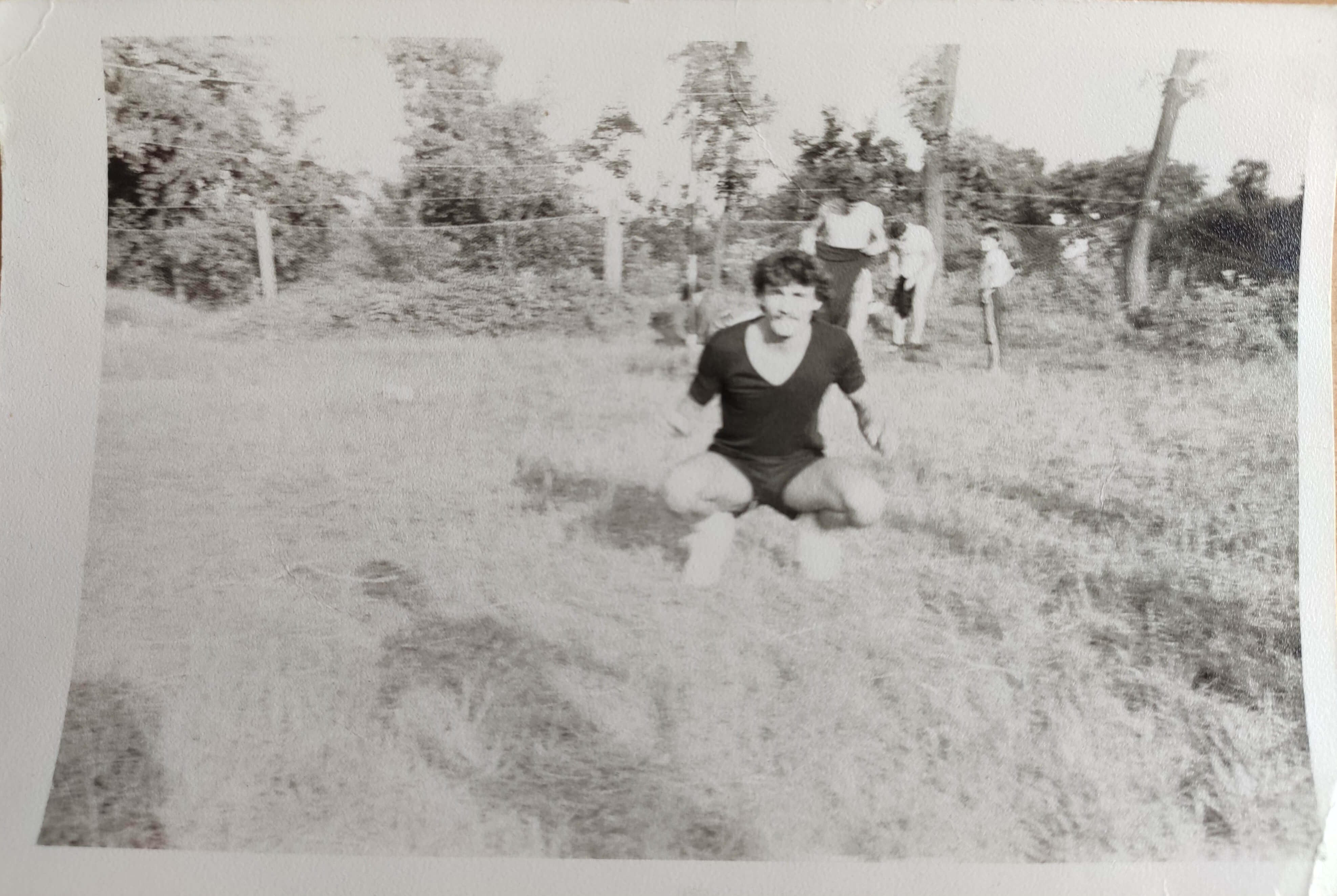
My father preparing for the football tournament in the early 70s, Private album/Dora Naletilić
According to Bijelić (2008) and his article The Beginning of Playing Football in Đakovo, “it was started by students who, over summer school holidays, stayed in the cities that did not abound that much entertainment for young people. Sports, or in this case, football, was supposed to enrich the social life of the place, expand the possibilities of creative expression and in socially acceptable way articulate the accumulated youthful energy.” There weren’t dressing rooms where participants could get changed in sports gear or leave their personal stuff. It was an open meadow with no shade, exposed from all angles. However, that did not stop anyone, they just wanted to play football.
Growing up in a Slavonian village during the 90s and 00s had its pros and cons but the biggest advantage was definitely sports tournaments that took place during summer school holidays. The anticipation could always be felt near the end of the school semester. Teams participating would be revealed and speculation would begin: Who is playing for which team? Who is leading them? Our neighbour? Someone’s brother? Sister? Cousin? Some guy from another village who was a professional athlete? It seems silly to the outsiders but for us, it was a highlight of the year. It started with Municipality Day, a village fair celebrating a local saint (in this case St. John the Baptist), an amusement park that entertained kids during the day and it continued until the evening when the summer tournament was about to start. It didn’t have a particularly fancy venue; a playing field made out of concrete suited for handball and bleachers which were made out of the same material. Nothing special. Until it was.
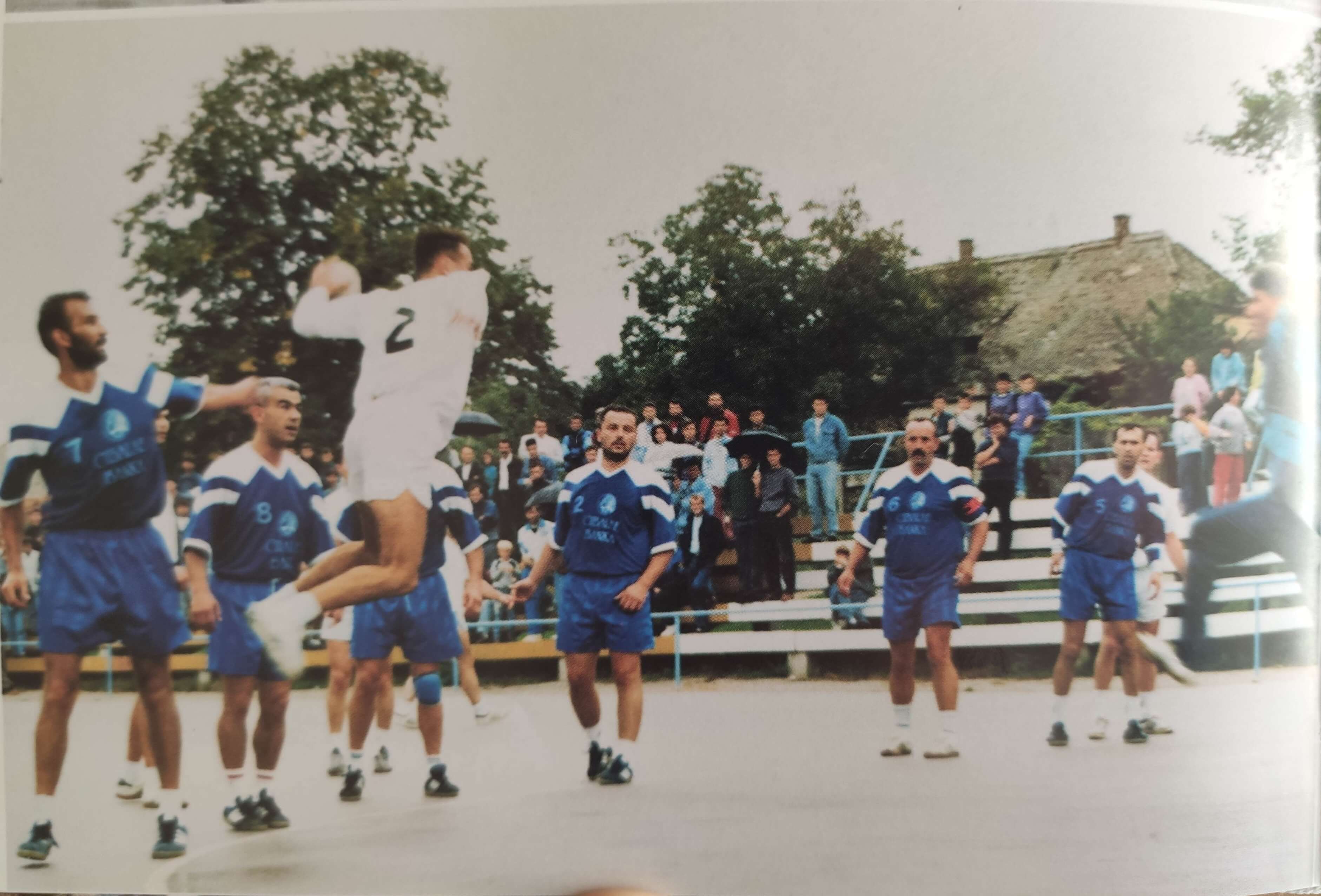
An old concrete field that was used for handball and football in the late 80s, "Rukometni klub u Ivankovu 1966 - 2016" book by Handball club "Cestorad" Ivankovo
The organization consisted of three main segments: the staff that kept the score and records of participants, sponsors of the venue, and of course snack bars, which were filled with local cuisine. When that was settled, the tournament could begin. The whole village of Ivankovo would participate in the event and support their own favorite teams. The supporting crowd would take out their own sirens that firefighters would use in their interventions and the atmosphere would seem like there was a huge national football cup game going on. Parents would drink their beers and nibble the seeds with their children, while the older folks would loudly comment on everything happening on the field. It was a picture-perfect small-town atmosphere that we (now young adults) think fondly of.
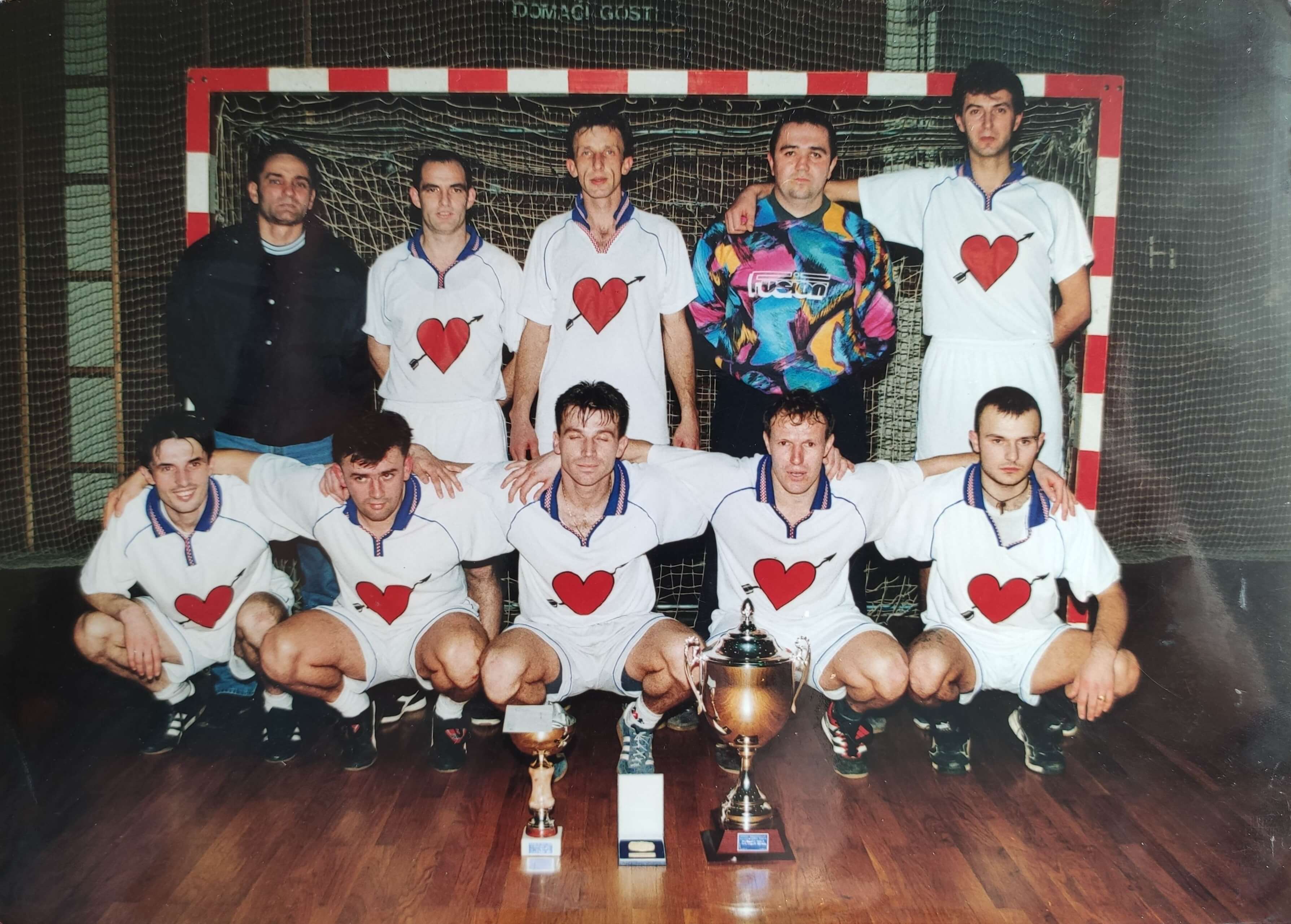
"Lutajuća srca" after winning the summer tournament, the early 2000s, Private photo album/Dora Naletilić
Looking through the old photos reminded me why I started loving sport in the first place. My father was constantly participating in villages sports tournaments, mostly football ones, where he would have his own team competing for the title of the best in the village. His team was called “Lutajuća srca” (Wandering hearts) and has won multiple tournaments over the years. One of the best feelings in my life was carrying that trophy across the field after excruciating penalties and the sound of the fellow villagers clapping and cheering.
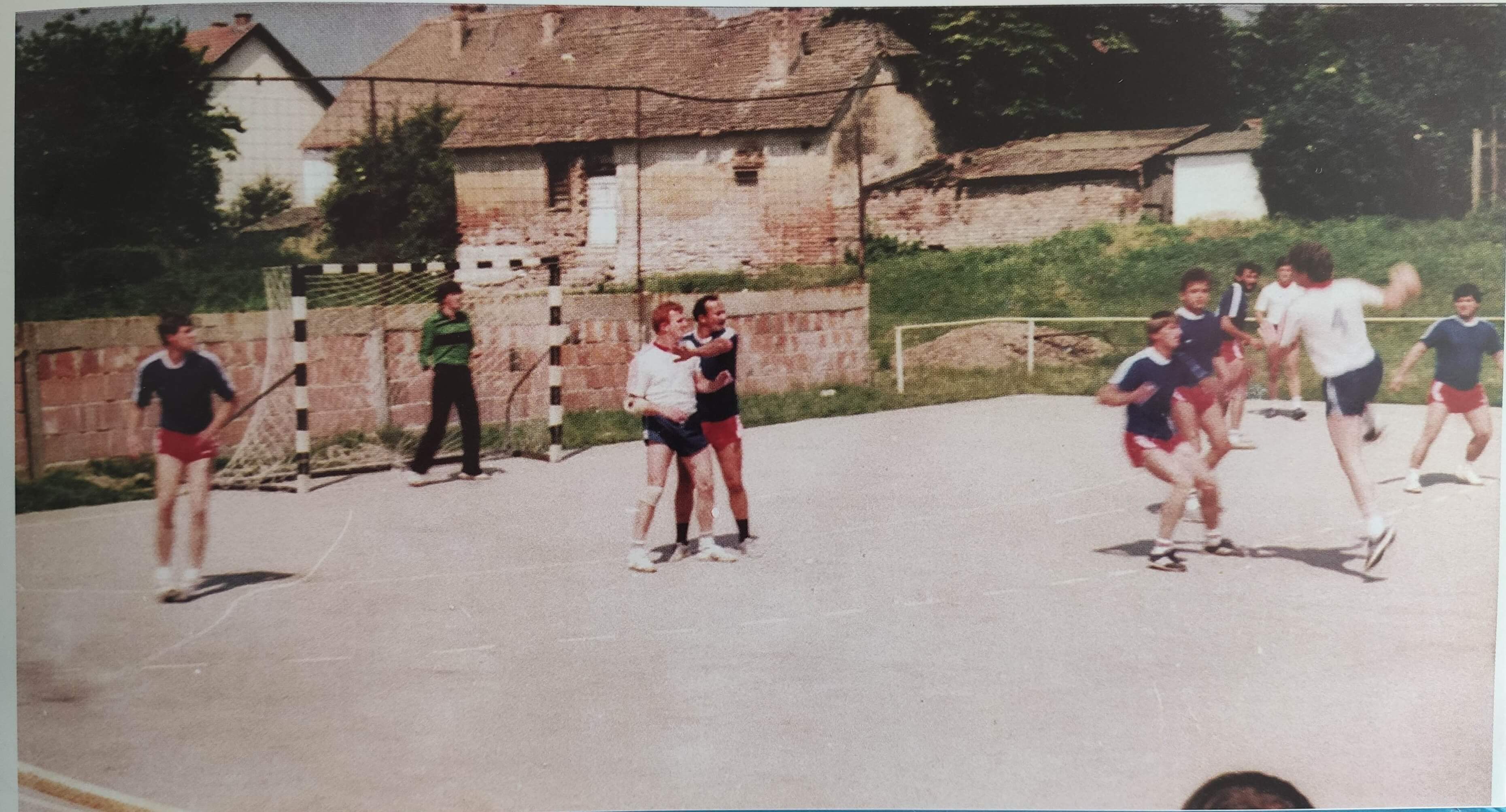
Old handball tournaments in 1986, "Rukometni klub u Ivankovu 1966 - 2016" book by Handball club "Cestorad" Ivankovo
Football wasn’t the only sport Ivankovo had to offer, handball always had and still has a big impact on sports fauna in this part of Slavonia. When the sports arena in Ivankovo was built, children and senior players finally had a venue where they could play their league games. After the mass, every Sunday morning people would go to the games and root for their team. Generations of families were always part of sports teams (including my brothers) and it stayed like that even today.
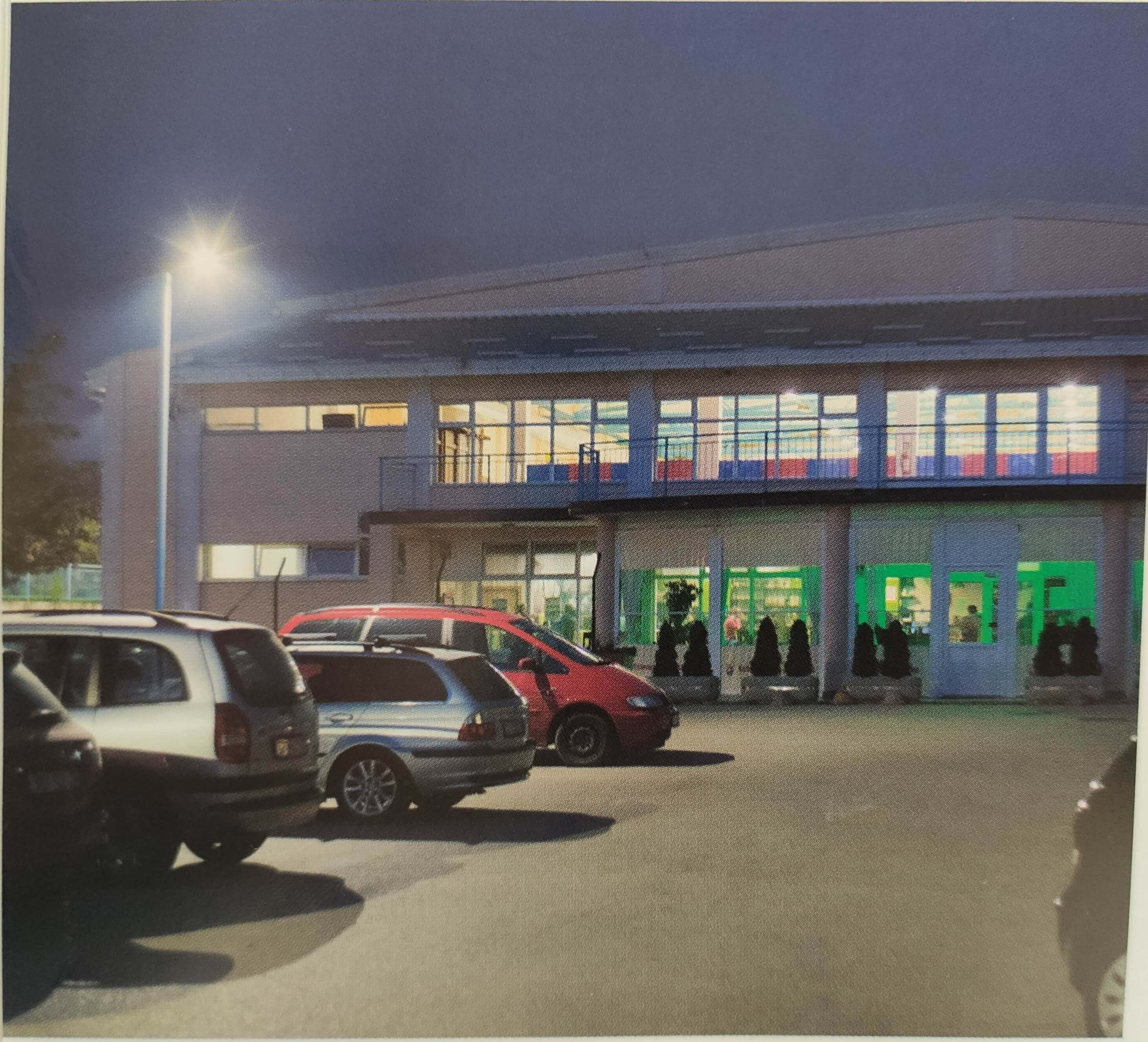
Sports arena opened in 2008, "Rukometni klub u Ivankovu 1966 - 2016" book by Handball club "Cestorad" Ivankovo
The annual summer tournament in Ivankovo maybe doesn’t have that charm it had 20-30 years ago but it’s still happening to this day. Sports games as a part of the “Summer in Ivankovo” are still going strong with other surrounding villages having their own traditional events. This only just shows that nothing in this country is taken for granted; if we love it, then we truly love it with all our hearts and souls. Sport is not just entertainment here, it’s the way of life. 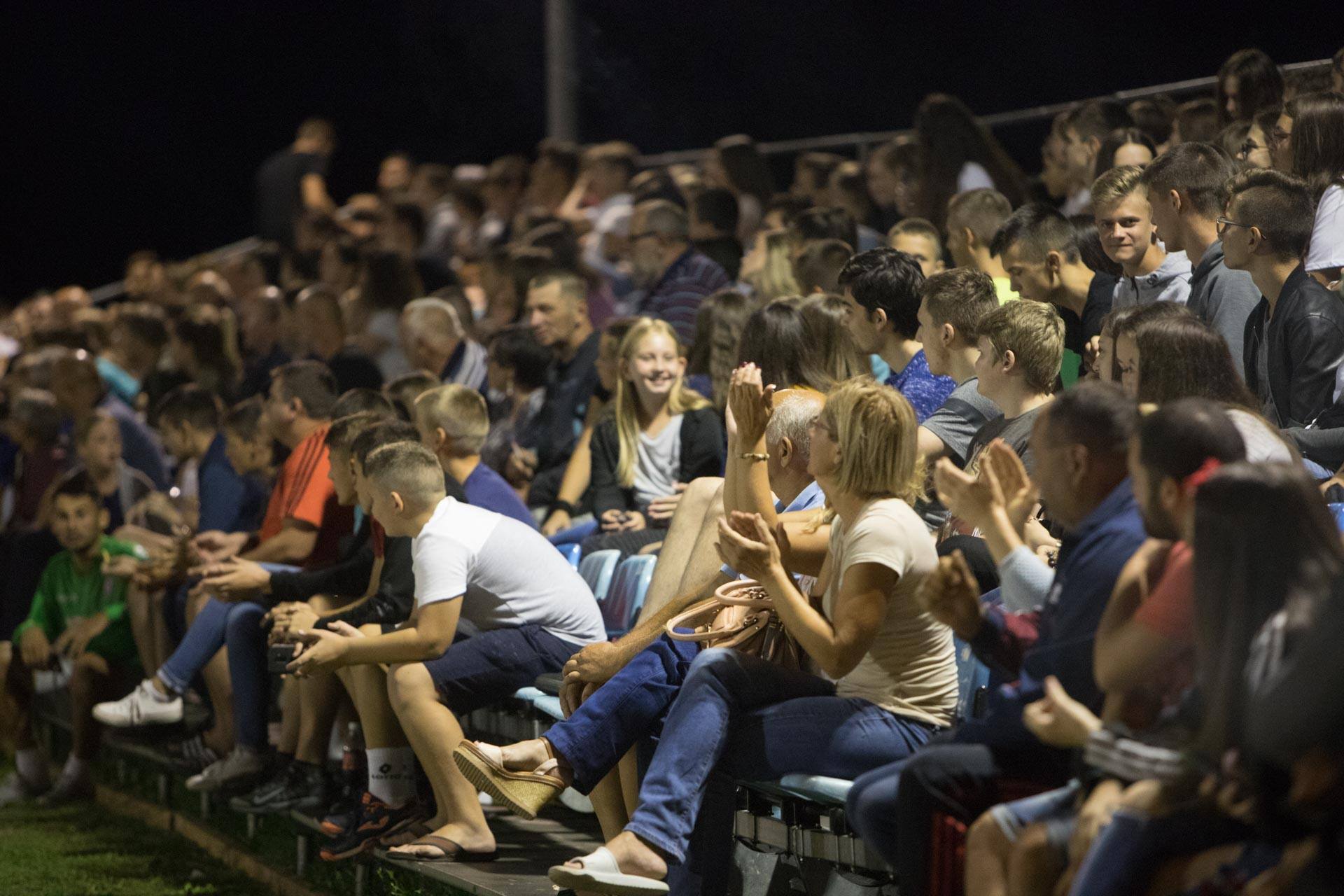
The crowd at a sports event during "Summer in Ivankovo", photo credit: Ivankovo.info
To read more about sport in Croatia, follow TCN’s dedicated page.
Neretva Boat Marathon to Be Held in Line with Anti-Epidemic Rules
ZAGREB, 13 Aug 2021 - Everything is ready for the 24th edition of the Neretva Boat Marathon, which will be held on Saturday in compliance with the epidemiological measures, the organiser of the event told Hina on Friday.
This year there will be 35 crews in this amateur sporting event, said Hrvoje Lazarević of the Neretva River Boatmen Association that organises this 22.5 kilometre-long race of traditional boats along the River Neretva from the city of Metković to the seaport of Ploče.
Thus, 23 crews are from the Neretva valley, another ten are from other parts of Croatia and two from abroad: one from Mostar and one from Sombor, Serbia.
Each of the 35 participating crews comprised ten rowers, a drummer and a coxswain.
This Boat Marathon, which has become one of the brands of the local community, will be covered live by the national broadcaster (HRT) on Saturday afternoon.
It is held under the auspices of Croatian President Zoran Milanović.
For more on sport, CLICK HERE.
Highlights of the Week: 5 Big Events in Croatia from June 28-July 4
June 3, 2021 - TCN's highlights of the week. A look at the events in Croatia from June 28 through the selection of TCN's reporter Ivor Kruljac.
EURO 2020 elimination and Dario Šarić in the NBA finals. Zagreb witnessing a series of arrests related to corruption of Milan Bandić's reign and explosive device planted in Split. In the midst of it all, is COVID-19 vaccination on its way to becoming obligatory and not optional? You may prefer the good news or the bad news, but here is both, as another week in Croatia comes to an end.
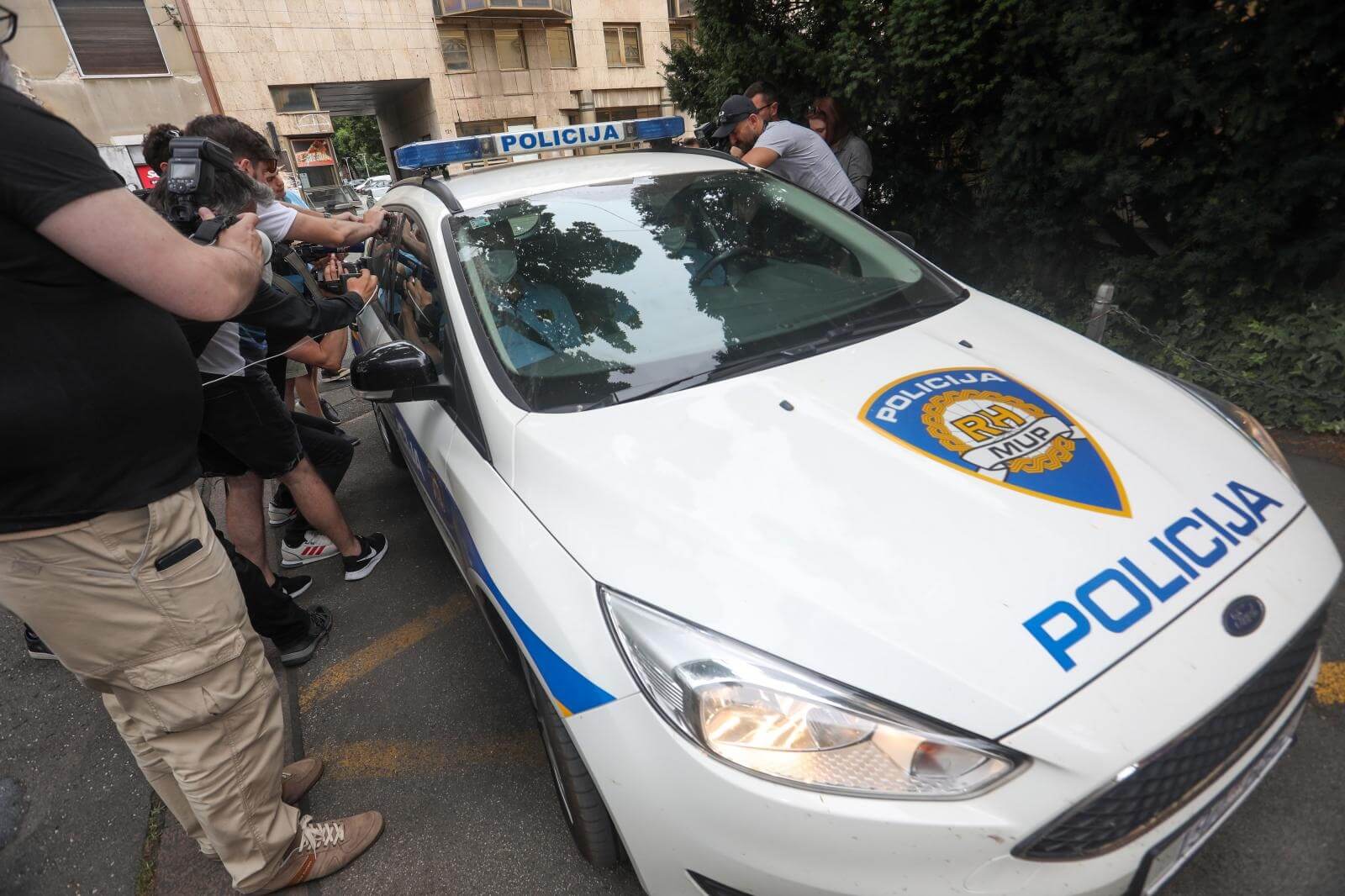
© Marin Tironi / PIXSELL
Highlights of the week: Uskok arresting Zagreb entrepreneurs and associates of former mayor Milan Bandić
The Office of Zagreb Mayor Tomislav Tomašević said on Wednesday that a preliminary investigation by members of the Office of the Chief State Prosecutor and the Office for Suppression of Corruption and Organised Crime (USKOK) started at the city administration offices at 6 am on Wednesday.
As TCN wrote, several people were arrested on suspicion of corruption, including the director-general of the HRT public broadcaster, Kazimir Bačić, Andrea Šulentić, and Ana Stavljenić-Rukavina. Both Šulentić and Rukavina were directors in Zagreb administration offices and close associates of former mayor Milan bandić. At the same time, details Bandić's heavy corruption (suspected and known publicly earlier) came to light.
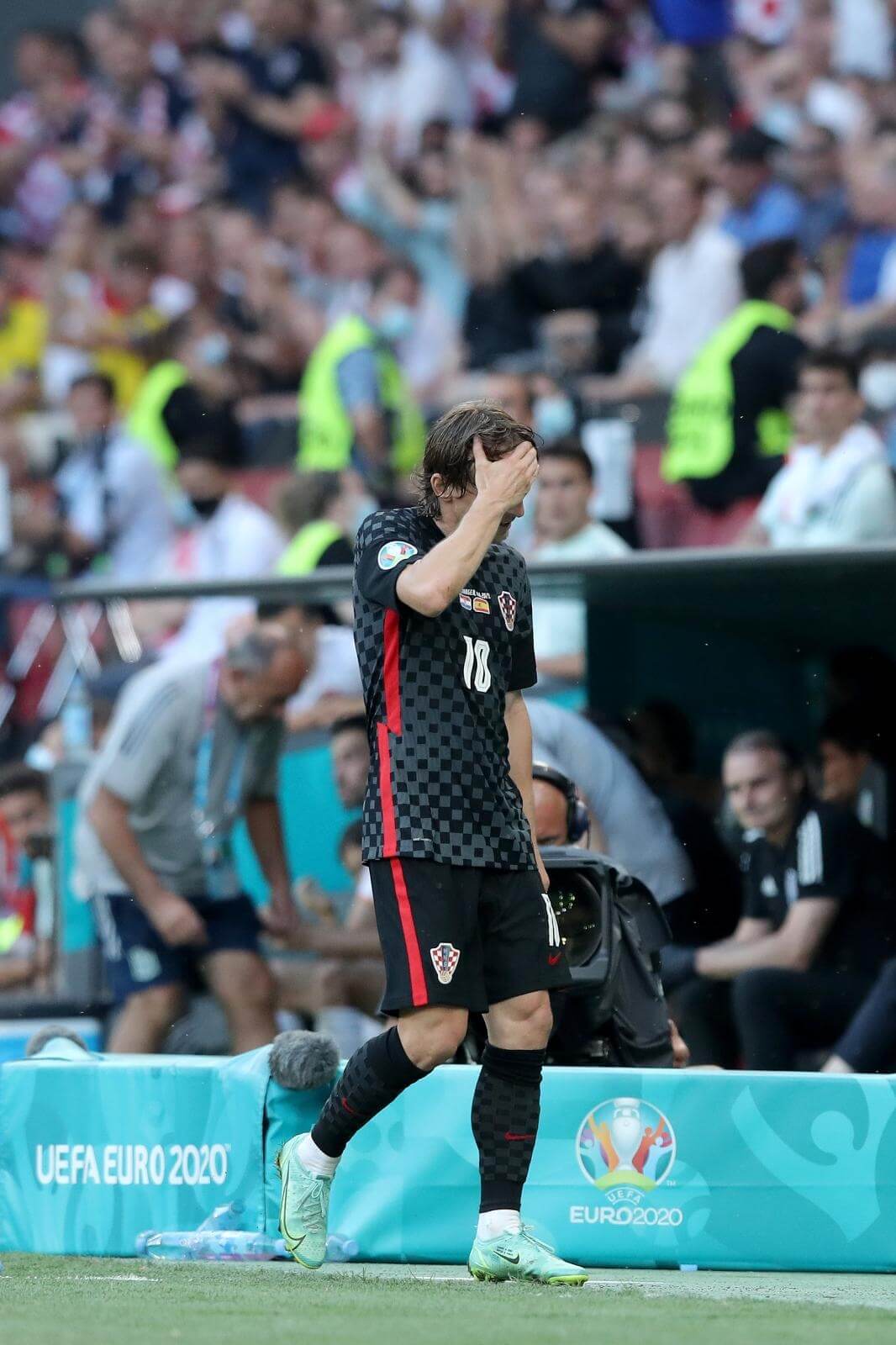
© Goran Stanzl / PIXSELL
Highlights of the week: Croatia eliminated from Euro 2020 after losing to Spain
Croatia and Spain met in Copenhagen on Monday for their EURO 2020 round of 16 match. It was a decent effort from Croatia, but not enough. Despite the Spain own goal in the 20th minute, the distraction as Rebić went to change his boots saw Spain even the score. The score towards the end of regular time went to 3:1 for Spain, but Croatia managed to lower to 3:2 and finally, in the added time, Pašalić scored for 3:3.
But, the euphoria was ruined for Croatia as in extra time, Morata earned Spain 4:3, and by 103rd minute, the total and final score was 5:3 for Spain. It was one of the more intense games on Euro so far as both teams show incredible spirit and persistence.
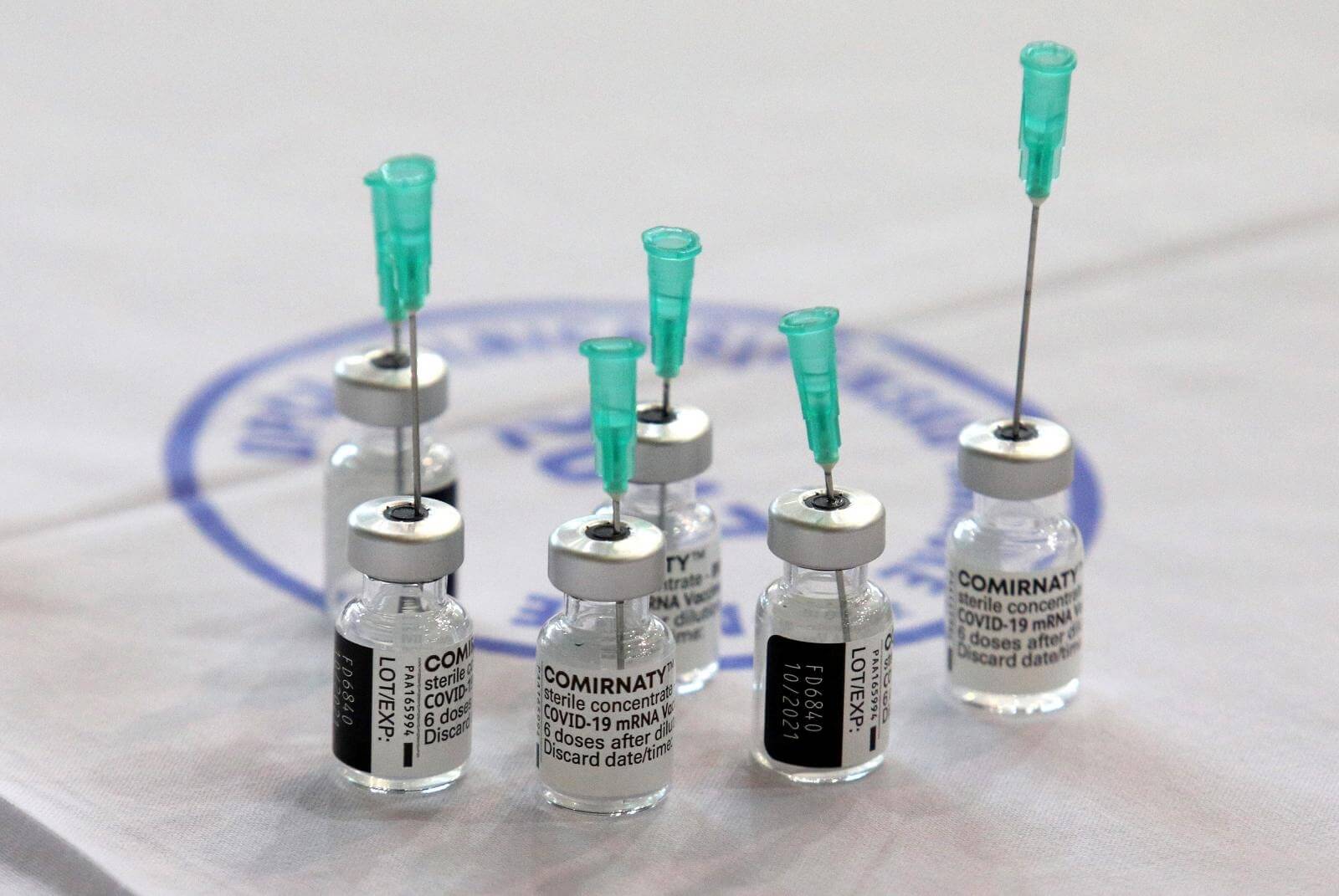
© Dusko Jaramaz / PIXSELL
Highlights of the week: Opposition parties against vaccination being required for job-keeping payments
The Social Democratic Party (SDP) called on Prime Minister Andrej Plenković on Thursday not to make vaccination a requirement for job-keeping payments, while the Most party said business owners were being blackmailed into vaccination.
As TCN reported, SDP leader Peđa Grbin elaborated his dissatisfaction via social networks.
"In Croatia, mandatory vaccination is possible, but the obligation is first established under the law on the protection of the population and then regulated and worked out under Immunisation Rules and the Mandatory Vaccination Programme. The obligation of vaccination can't be imposed in another way, notably not by linking support for entrepreneurs with vaccination," SDP president Grbin posted on Facebook.
"Most is against entrepreneurs, who are being forced into vaccination through blackmail, saving the government's mindless epidemic policy", stated the Most party on its official Twitter account. They added that Croatia was stuck with over 300,000 surplus vaccines because of poor government moves and communication omissions.
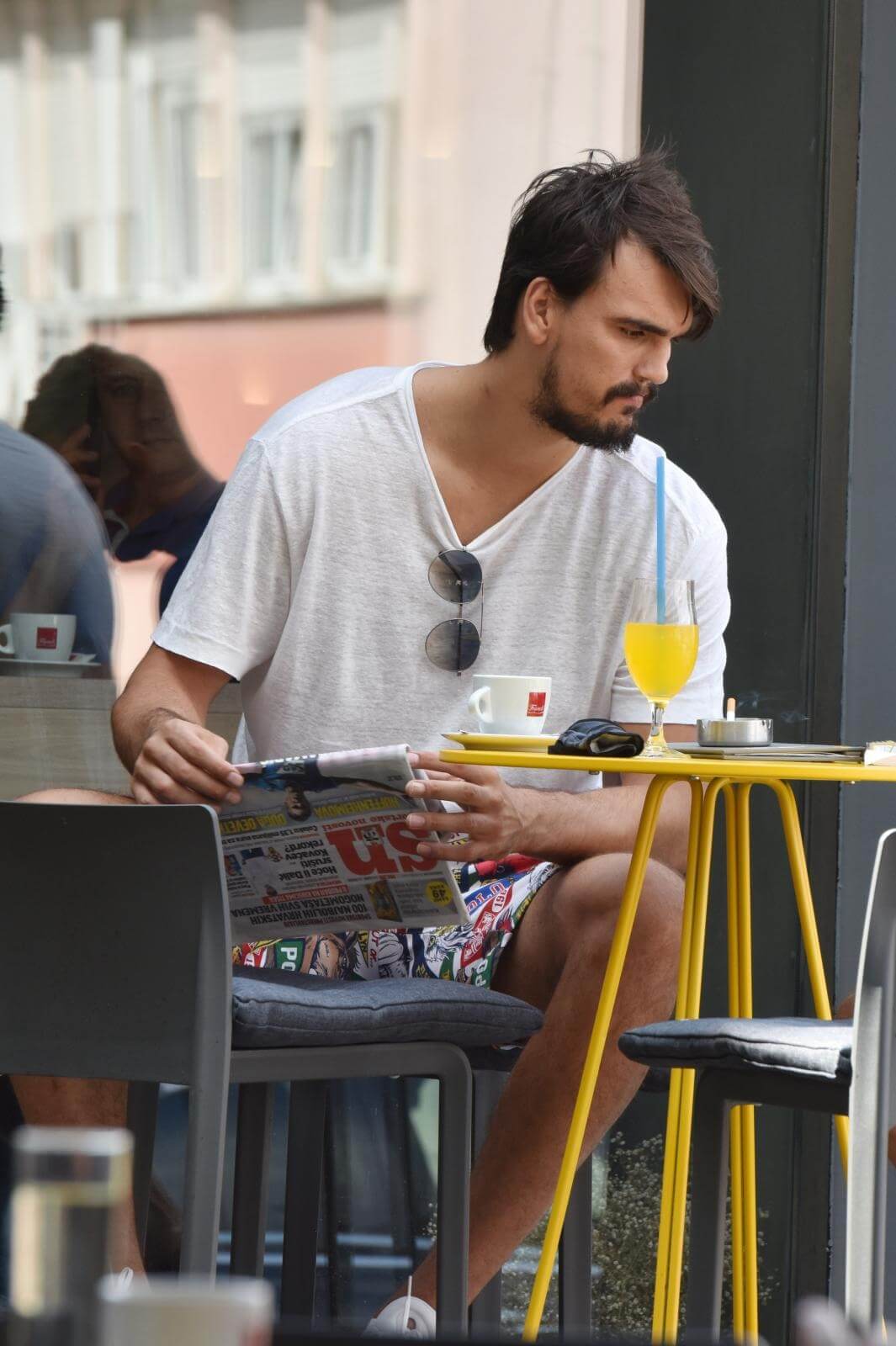
© Hrvoje Jelavic / PIXSELL
Highlights of the week: Dario Šarić becomes 5th Croatian basketballer in the NBA finals
Šibenik's Dario Šarić is the 5th Croatian basketball player to reach the NBA finals! As TCN wrote, Šarić became only the fifth Croatian basketball player in the NBA league finals, joining the company of Dražen Petrović, Toni Kukoč, Žan Tabak, and Ante Žižić. Šarić plays for Phoenix Suns. They topped the Los Angeles Clippers 4-2 in the NBA Western Conference Finals. Apart from basketball, Šarić also likes to enjoy sipping coffee on Šibenik cafe terraces, as portrayed in the photo.
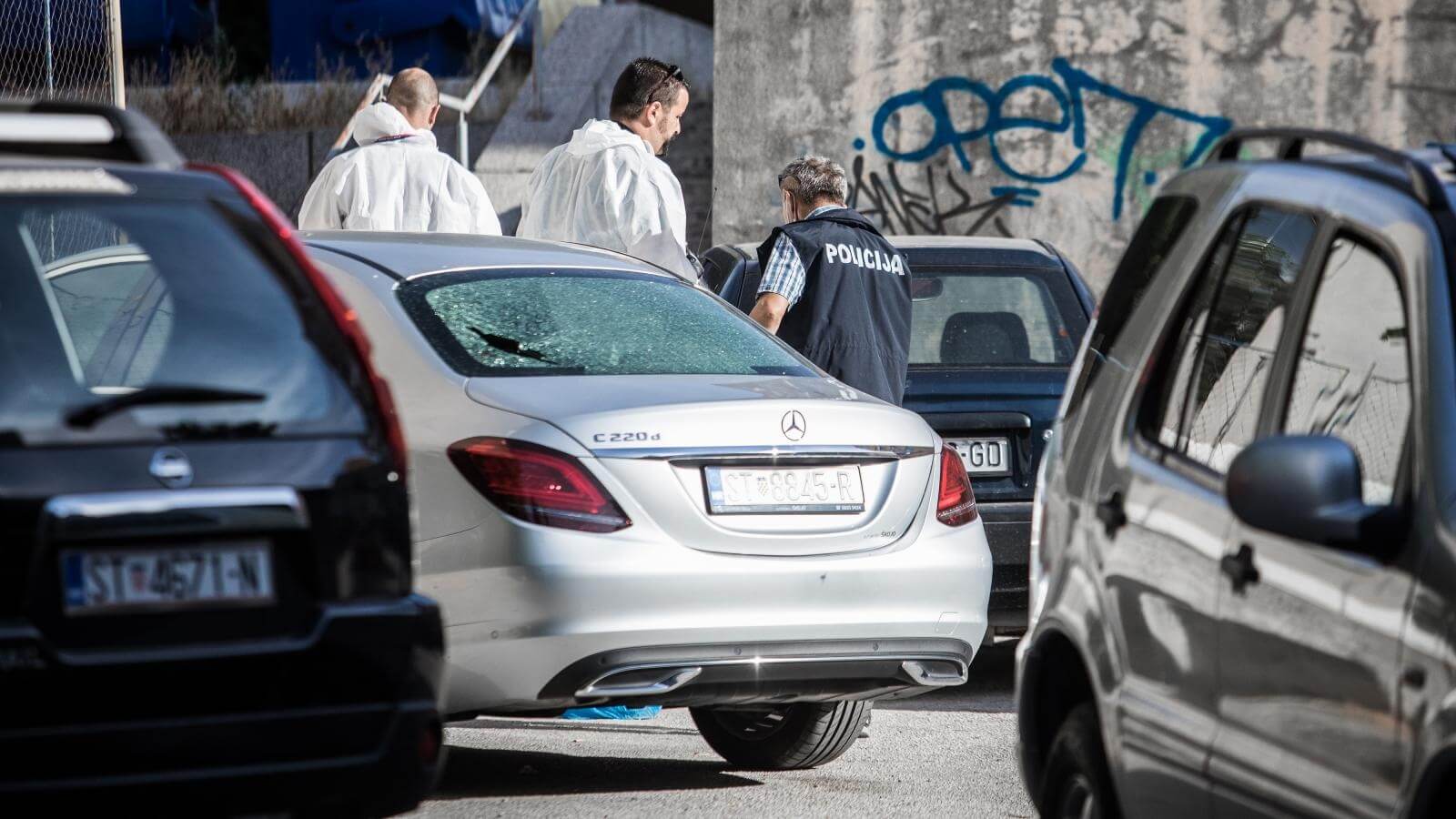
© Milan Sabic / PIXSELL
Highlights of the week: Bomb planted in Split. One person injured
In the night from Thursday to Friday, an unknown person placed an explosive device underneath a vehicle. The explosion damaged six cars, and one person required medical attention. The investigation is ongoing since Friday morning.
To learn more about Croatia, have a look at our TC website.
For more about news in Croatia, follow TCN's dedicated page.
Friends of Croatia: Japanese Embassy - Friendly Relations between Croatia and Japan
June 17, 2021 -The eighth article in the series, "Friends of Croatia: Japanese Embassy", saw TCN reporter Ivor Kruljac sit down with Japanese Ambassador Misako Kaji and discuss all things regarding diplomatic relations between Japan and Croatia. Overall, Croatia and Japan are friendly countries with many shared values. With Croats and their expertise in improvisation and the excellent crisis response of the Japanese, the two countries can benefit greatly by learning from each other.
Croatia and Japan officially established diplomatic relations on March the 5th, 1993.
I was nervous while the taxi drove me to the Ambassador's residence. Japan is known for punctuality, and I worried whether or not I'd manage to make it on time as my cab was trying to break through Zagreb's midday rush. But in the end, I managed to arrive ahead of schedule. It was great that I wasn't late, but that's still clearly a very far cry from the punctuality of a country where a train conductor apologised when the train left the station 25 seconds ahead of schedule.
As I was rewinding the questions I had prepared in my head, I thought about greeting my interlocutor-to-be. Handshakes are a bit of a risky thing due to the coronavirus pandemic, but even if that annoying virus was somehow erased from existence, in Japanese culture, people would still greet each other by bowing. Do I need to bow, or does the Ambassador need to follow the Croatian culture of handshaking (or perhaps bumping fists in these pandemic-dominated times)?
Cultural Attache, Yutaro Nishida welcomed me to the premises, and at last, introduced me to the Japanese Ambassador Misako Kaji, who welcomed me with a smile, respect, and kindness. The debate on whether to bow or fist-bump was resolved by doing both, with both sides respecting and accepting each-others cultural background. For safety, I kept my mask on while the Ambassador removed hers so that her voice could be more clear as the interview was recorded. I moved my mask only occasionally to drink the amazing traditional green tea that was served during the interview, which was paired well with a warm and friendly atmosphere from the official representative of Japan in Croatia.
Misako Kaji graduated with a BA in the economy at the University of Tokyo, followed by an MA in philosophy, politics, and economy at no less than Oxford University. Inside the Japanese Ministry of Foreign Affairs, she served in the Japanese Embassies in the UK and Vietnam, but also in Japanese EU and UN missions. As an Ambassador and deputy of the main representative, Kaji also served in Japan's Delegation to international organisations in Geneva. In Japan, she was the deputy spokesperson for the Japanese Prime Minister and was a professor at the Tokyo and Hitotsubashi Universities. Ambassador Kaji also has quite some experience with the United Nations (UN). She was a special advisor of the high committee of the UN Refugee Agency (UNHCR) as well as a member of the UN Advisory Committee on Administrative and Budgetary Questions and a member of the advisory committee of the UN Peacebuilding Fund. She has represented Japan in Croatia since May 2019. Two years and twenty days, as she stated on the day of the interview that occurred last Friday.
Japanese culture is beloved in Croatia
''If you'd asked me a year ago, I would've said the Adriatic sea, the scenery, and the colour blue, all of these wonderful UNESCO heritage sites and nice people ready to help when you're travelling,'' started Ambassador Kaji, explaining what she had found most interesting and impressive in Croatia.
''But, after two years, I have something more to say, and what I like about Croatia is the 'Japan' I encounter in Croatia, and that is a very positive discovery. I didn't realise Japanese culture was so widely embodied in a variety of Croatian minds,'' noted ambassador Kaji.
The most recent instance was last week's handover ceremony of the Foreign Minister's Commendation to the Croatian Origami Society, which took place at the Ambassador's residence. Some of the members have been engaged with this artistic papercraft (taught in Japanese kindergarten) for over 20 years now.
''They are very much interested and dedicated without being imposed or forced to be, and its members included chemistry students, medical doctors, and even an 11-year-old boy. There were so many different categories of profession, and some even folded Origami while on probation, and that is where they'd encountered the art of origami,'' continued the Ambassador, fascinated with such love for one of the essentials of Japanese culture, keeping hold of plenty of works donated by participants of the ceremony.
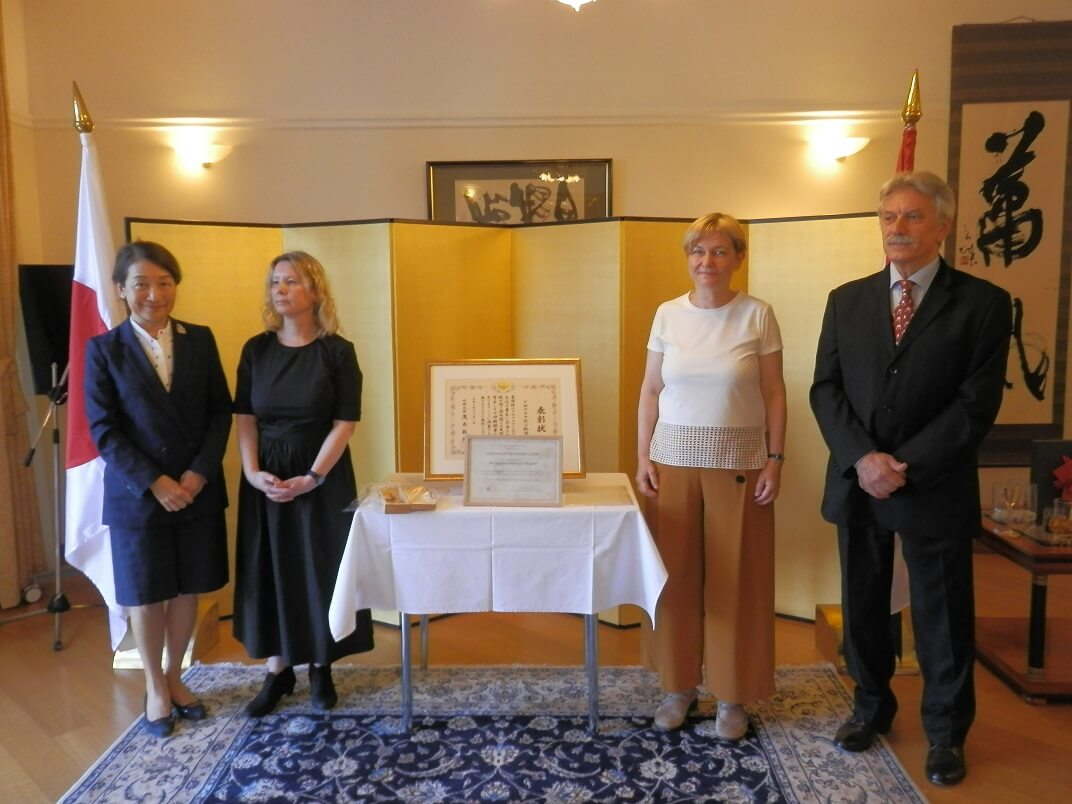
The handover ceremony of the Foreign Minister's Commendation to the Croatian Origami Society, June 2021 © Japanese Embassy Croatia
She is also particularly delighted with Biograd na Moru, a Croatian city in the Zadar area that not only commemorates the Atom Bomb falling on Hiroshima and Nagasaki but also has a metal crane bird as a monument to this dreadful tragedy that occurred on August the 6th, 1945.
''There is a legend that cranes live for a thousand years, so they are often used as presents for somebody who has been met with disasters or illness. In Hiroshima, they have a thousand cranes (made in the origami technique) folded and presented for the wish of peace,'' explained the Ambassador. Such a ceremony was also seen in Biograd na Moru, initiated by mayor Ivan Knez with a large metal crane made to outlast paper for generations to come.
The Japanese martial art of Karate is also popular in Croatia with some quite good successes achieved by Croatian athletes. Last month, the European Karate Championships were held in Poreč, where Ambassador Kaji was invited and was again fascinated with the use of the Japanese language and overall traditions despite there not having been a single Japanese athlete present there.
With so much of Japanese culture being present here in Croatia, it's difficult to say what the most beloved aspect of Japanese culture is for the Croats.
Before the pandemic struck, Ambassador Kaji remembered the Japan Day event in Zagreb's popular Mimara Museum, which saw huge attendance and a presentation on Japanese food, sake (Japanese rice schnapps) degustation, Ikebana (flower art), a tea ceremony, bonsai (aesthetical horticultural shaping of small trees), martial arts such as Karate, Judo, Kendo, haiku poetry workshops, calligraphy, Igo chess and much more.
2019 was also a big year for a Japanese promotion with the 2020 Olympic Games, which saw Croatian athletes from the 1964 Olympics attend the promotion for 2020. Additionally, for Japan, as Ambassador Kaji pointed out, the Paralympic Games are an important measure for the general success of the Olympics, which was evident in the ParaBOX installation (where visitors were challenged to find a ball in complete darkness), and the presentation of the Japanese car company Toyota's car which is designed to be able to be driven by people with disabilities.
However, when it comes to younger people, particularly students of Japanology (which Croats can study at either Zagreb or Pula University), one cultural trend emerged.
''The Japanese language is very tricky to learn, so I asked one graduate student how she first encountered Japan and heard the language, and it was anime,'' Ambassador Kaji recalled. She added that the Japanese cartoon art of anime became pretty universal and is no longer limited only to Japan. (The same goes for Japanese comics such as manga, with both of these pieces of pop culture being incredibly diverse in genres and having something for everyone, covering all social groups and even not avoiding vivid graphic images of violence and/or sex).
''At the Foreign Ministry of Japan, we have an award from a world competition because of the promotion of manga, but without trying to focus or push deliberate energy into that promotion,'' stated Ambassador Kaji.
As Japanese pop culture, anime and manga are indeed very popular here in Croatia, which is visible at the Pandakon conference that is held annually at Zagreb's Močvara club. Fans often dress up as their favourite characters, and there are often rewards for the best cosplay.
However, there are also heated debates between fans and people in the manga/anime industry that also affect Croats. On the one hand, representatives of the anime and manga industry are unhappy with cosplay, viewing it as a copyright infringement and believing that fans should be paying for cosplaying these characters. On the other hand, fans say they are just trying to show love and appreciation for their work, and they are also promoting and attract new audiences. It's indeed true that someone might not know what is ''Deadman Wonderland'', but upon seeing a brilliantly crafted cosplay of Shiro, they may ask the cosplayer about the character and then watch anime or read manga.
Ambassador Kaji says the Japanese Government is aware of the problem.
''Earlier in January, the Minister for the "Cool Japan“ Strategy (with Cool Japan being a brand strategy, aiming to disseminate Japan's attractiveness and as a unique culture throughout the world), Shinji Inoue said that he was aware of an opinion among the cosplay community rising, and this could be a real legal problem. It was important to secure an environment in which people can enjoy cosplay at ease, without worrying about possibly breaching laws. So, the Minister declared that he would come up with ways to deal with it but has not yet specified what those ways will be,'' explained the Ambassador.
Friendly Nations: sharing values, but trade could be better...
The cosplay question is one of the political issues in Japan, but when it comes to politics, what exactly is going on between Croatia and Japan?
''We're friendly countries; we share the same values. Unfortunately, you can't speak your own mind in every country, but Croatia and Japan belong to those countries where you're free to have as many children as you want, free to say what you like, free to travel where you want, free to choose your own vocation. In other words, we're both free countries that share the same values, democracy, human rights, and rule of law,'' said Ambassador Kaji, adding there are occasional disagreements, but that is normal and nothing to worry about.
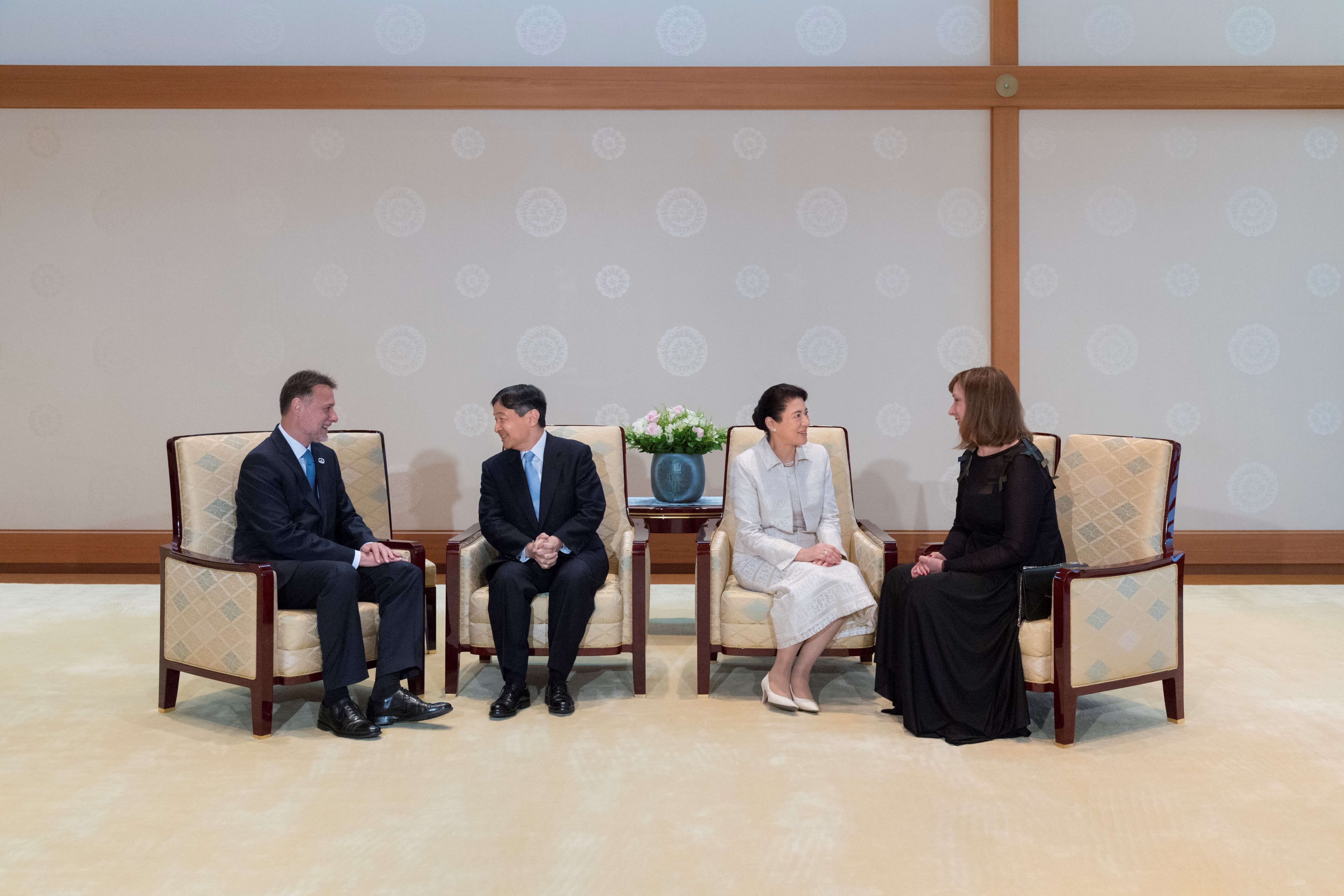
The Emperor and Empress of Japan grant an audience to the Speaker of the Croatian Parliament Gordan Jandroković and Mrs Jandroković during their visit to Japan upon the invitation of Speaker Oshima of the Japanese House of Representatives, June 2019 © The Imperial Household Agency
Kaji also pointed out that Croatia is pretty prevalent in Japan thanks to its sporting heroes. ''Everybody knows who Modrić and Čilić are; Croats are disproportionately present in world sport,'' she said.
Ambassador Kaji also rates Croatian EU membership as a great advantage.
''Through the EU, you're very well represented. When Croatia held the European Council Presidency during the first half of 2020, one of the most important parts of Croatian foreign policy concerned the Western Balkans and you advocated the EU's perspective for them as we don't want to roll back into a conflict or the changing of the borders after such a great sacrifice,'' Ambassador Kaji stated, referring to the war back in the '90s.
An important instance of that is the Zagreb Declaration from June the 22nd, 2020.
''We're part of the group that supports the European idea, and through that, the Croatian idea, as we share the same values,'' confirmed the Ambassador.
She added that while it may seem far away, the issues of the Balkans are relevant to such ideas like the Free and Open Indo-Pacific, and advocating the peace and freedom of nagivation, for example, is required on both locations, and Japan sees Croatia as a partner in that regard.
Ambassador Kaji also regularly contacts the Croatian Ministry of Foreign and European Affairs (MVEP), the Government, Parliament, the President's office, various cultural institutions, sports institutions such as the Croatian Judo Federation, the Croatian Karate Union, and the Croatian Olympic and Paralympic Committees, educational institutions, local government units and more. She also works on maintaining friendly ties with other ambassadors and diplomats in Croatia.
''My diplomatic colleagues know that only those who are blessed get to be stationed in Croatia,'' revealed Ambassador Kaji, not hiding her happiness for representing Japan in this Southeastern European country.
She is also particularly excited about going to Virovitica this week since she has never been. The visit is to attend the exhibition on Japanese pottery titled ''Yakishime: Earth Metamorphosis'' which is coming to Virovitica after already having been held in Vukovar and Pula.
Commenting on the most frequent contact she keeps in Croatia, she said that it's very hard to say, but statistically, maybe the Japanese Embassy communicates the most with MVEP. ''We're only two minutes away from the Ministry,'' said Ambassador Kaji.
Of course, not everything can be equally balanced and trade is unfortunately currently sitting on pretty low branches of the overall tree.
''When it comes to trade, we made up only 0.28% of Croatia's exports with tuna being a major portion - which is nice. In addition, when it comes to investments in Croatia, only 0.5% of all investments come from Japan. So there's room for improvement there,'' stated Ambassador Kaji with optimism.
Some of the instances of trading and business between the two countries can be seen in the Japan-based company Nipro taking over Piramida, a Croatian pharmaceutical packaging producer from Sesvete near the City of Zagreb last month.
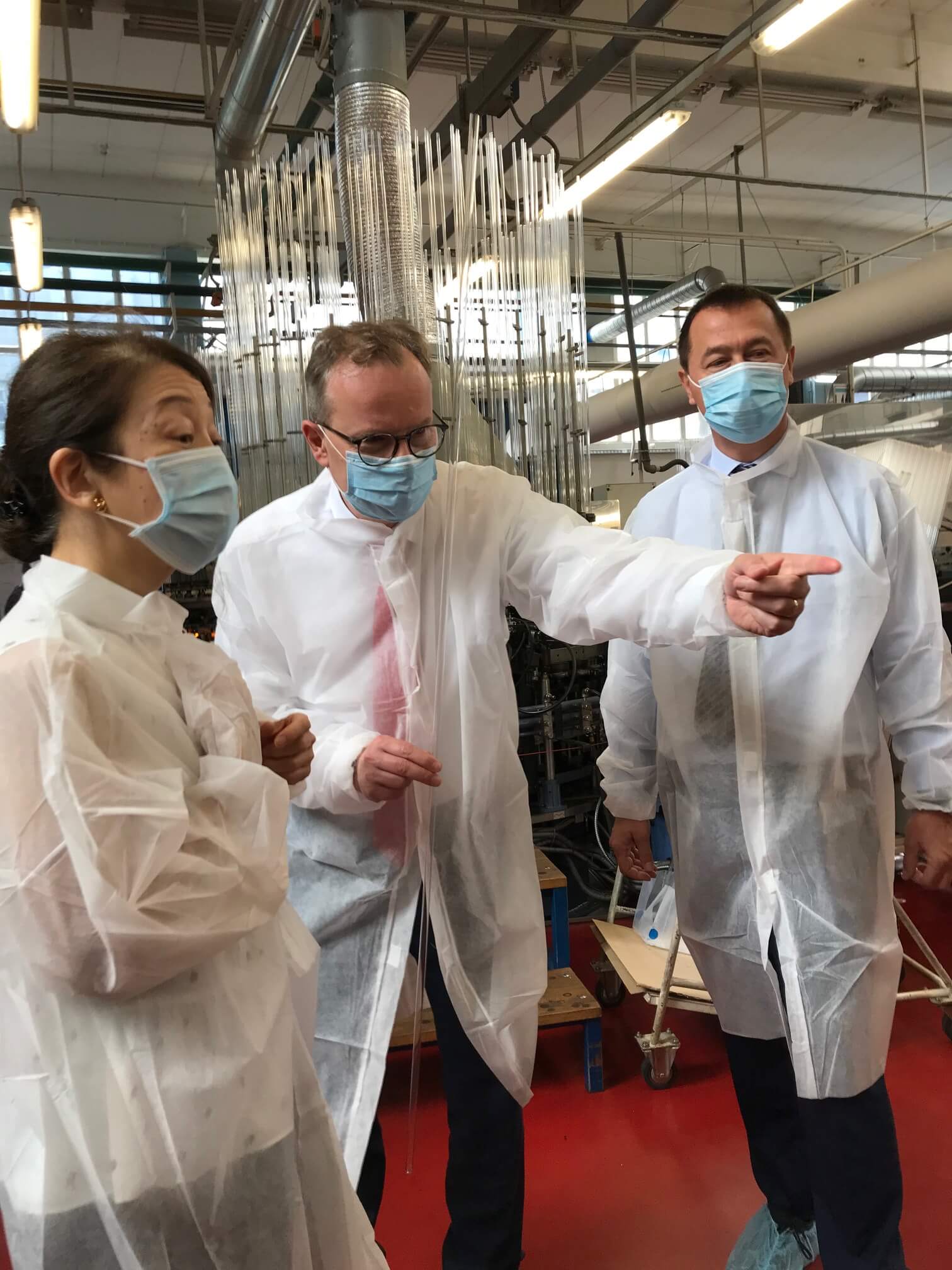
A visit to Nipro PharmaPackaging Croatia, June 2021 © Japanese Embassy Croatia
Knowledge – the way forward while not forgetting culture or tradition
As mentioned, Japanese culture is widely popular and much loved among Croats, the Japanese love Croatian athletes, and the two countries share friendly relations. Both Croatia and Japan have their traditions and cultural heritage. With ever-present technological development, some people in Croatia do fear that progress will lead to Croats forgetting their traditions, ways, and cultural heritage. On the other hand, Japan has seen huge technological development evident in very fast internet, modern trains, robotics, and more. Yet, their tradition and culture remain well preserved. What's the secret, and how can technological advancement be balanced with keeping a focus on tradition?
As Ambassador Kaji explained, the gist is to ''keep your spirit, but introduce technology''. While the Ambassador believes that the path of economic development makes sense in the long term, it wasn't always so easy. In the past, economic development was accompanied by pollution, and Japanese people, apart from developing health issues, entered an atmosphere that wasn't very kind to their traditional ways. But things have improved since then.
''In the 21st century, people and governments are more focused on green technologies and digital technologies which can be friendly towards and resonate with keeping up with traditions. Like when drinking tea, you have a ceremony, but the leaves for the green tea need to be carefully nourished in a kind environment, so that isn't very compatible with mass production or polluted air. But when, for example, you use the wind to produce energy, that's a nice eco-friendly way that co-exists with traditional culture,'' explained Ambassador Kaji.
She added that this way of co-existing then becomes mutually supportive and crafted to be resilient and long-lasting. That being said, new technologies also need to be carefully crafted to keep an eye on traditions, and improvisation is troubling in that regard.
''If you show respect for tradition, and you use academic knowledge or research, then there must be a way of remaining aligned with tradition and pursuing technology to have them both be mutually supportive,'' concluded Ambassador Kaji, and her belief about Croatia's technological development is that it will not be fatal to Croatian tradition.
Speaking of tradition, traditions form habits that then become accepted in various societies. With the already mentioned Japanese love for punctuality and the general perception of the Japanese as organised people that like order and plans, the perception of Croats can be quite the opposite. Many see Croats as laid back and relaxed, not making a fuss if they are a bit late. However, Ambassador Kaji sees a different picture of the Croats from her experience, particularly when it comes to Croatian women.
''A cleaning lady from Slavonia that comes to clean my office every day just starts working and cleans meticulously. She doesn't leave one small thing out and she is very responsible. In Japan, you don't see so many women gardening, and here, the women that watch over my garden are very powerful and professional, and that is very impressive,'' she noted. The work ethic and responsibility are something she sees with all of the Croats working for her.
''When it comes to Japan, we plan for perfection, so the dark side of that characteristics is, for instance, being late with the vaccination rollout. There are all sorts of verifications that take place there, making sure everyone can get them, and yes, they're proven safe abroad, but we had our own evaluations done, and that was the main reason we've been criticised for being too slow. Here in Croatia, you're really good at improvising. We can learn from each other,'' Ambassador Kaji said, sharing her observations on the habits of Croats and people in Japan.
She added that one such thing where Croatia can learn from Japan is crisis response, particularly when it comes to earthquakes.
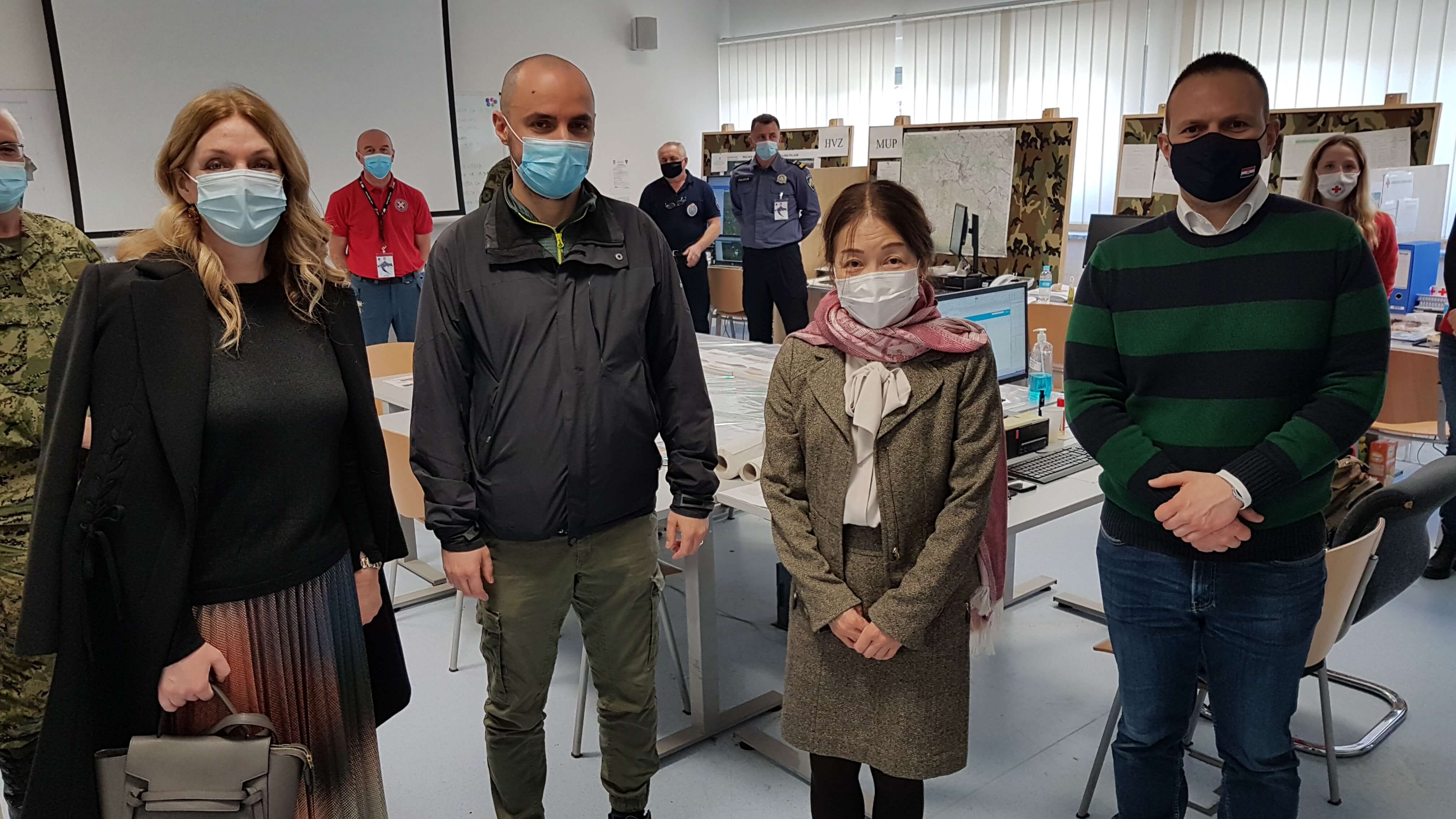
At the Civil Protection Headquarters for Dealing with the Aftermath of the Petrinja earthquake in December 2020, March 2021 © Japanese Embassy Croatia
Post-earthquake reconstruction by Japanese experts: Zagreb's buildings can keep their looks and also become safer
Japan is famous (or as Ambassador Kaji rated with a humorous touch, perhaps notorious) for regularly having earthquakes. Tsunamis happen as well. This was even noticed by reporters from the Croatian paper Jutarnji List, who, when following the earthquakes in Zagreb and Petrinja, interviewed Ambassador Kaji in search of advice on living with earthquakes. An equipped backpack with water, food, batteries, and lights ready for evacuation, along with agreeing on a location at which were to meet with your loved ones, are some great bits of advice for planning once you accept that earthquakes can happen at any time, anywhere.
''You can't stop earthquakes, but if you're prepared, you can mitigate the damage they cause and protect lives. People often think earthquakes happen, and that's that, but earthquakes are never over,'' said the Ambassador when recalling that interview.
''I was at my residence when the Zagreb earthquake happened more than one year ago, and the epicentre was just three kilometres away. It was pretty bad but not serious with only small cracks on the wall,'' recalled Ambassador Kaji, not seeming to feel unsafe in a Japanese earthquake-conscious building, while Croatia isn't always so aware that the Earth's plates can move and cause total chaos.
The earthquake that gave Zagreb such a heavy blow in March 2020 is a normal monthly, if not weekly, occurrence in Japan. The country's ultra-modern buildings and skyscrapers were built to sustain such rumbling, but even the traditional signature Japanese style of architecture (such as the signature Pagoda of Horyuji, the oldest wooden high-rise Japanese building built in 680A.D.) sustained numerous earthquakes over centuries, as Japanese builders always had to try to cope with earthquakes. But, with Zagreb being proud of its architecture, particularly in the downtown area, can the Croatian capital possibly preserve its signature look but also become safer for its residents if such magnitudes or higher strike once again?
''I asked some Japanese experts about whether or not it would be possible to preserve the nice, historic architecture of Zagreb and not just totally transform it into a modern but very common city, and they said it was possible. That needs investment, but there are ways to somewhat reinforce the basic structures and preserve their looks,'' assured Ambassador Kaji. She also added that the speed and focus of reconstruction is something Croatia can learn how to be better at from Japan.
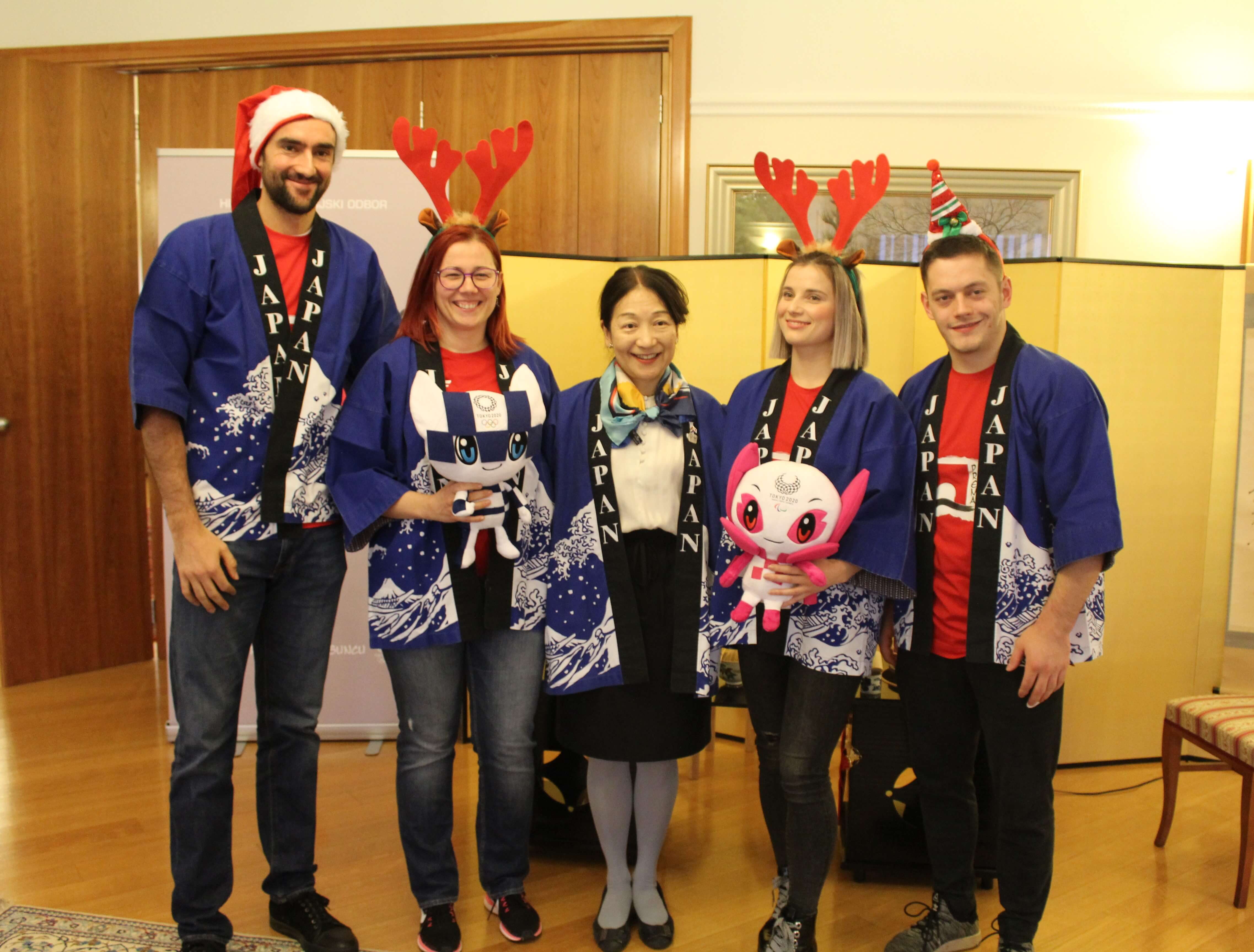
Towards the Tokyo 2020 Olympic and Paralympic Games, December 2019 © Japanese Embassy Croatia
The Adriatic is nice, but UNESCO heritage really excites Japanese people
With data acquired before coronavirus, Ambassador Kaji stated that there were 150 Japanese nationals living in Croatia, and 150,000 Japanese tourists visited the country. What several people noticed was that while many foreigners come to Croatia primarily to enjoy the coast and swim in the Croatian Adriatic, Japanese tourists can rarely be seen on the beach and prefer sightseeing.
''Japan is surrounded by the sea, so the sea isn't something amazing to them, but Japanese people are very interested in cultural heritage, and when something is recognised by UNESCO, people in Japan really rejoice. So, the Japanese are very much interested in historical or artistic values Croatia offers,'' explained Ambassador Kaji, clarifying why so many Japanese tourists can often be seen as frequently in continental Croatian towns and cities and not just on the coast.
Despite some Croats sometimes being a bit xenophobic or looking differently at people of other races, Ambassador Kaji was surprised when asked about whether there were any racial issues that Japanese people experienced and reported in Croatia.
''I don't know if things were different before regarding racial issues, but the story I heard when I came to Croatia was that back in 2011, many Croats gathered in front of the Embassy of Japan with flowers, candles, and cranes to express their grief and support regarding the Fukushima Tsunami and the earthquake,'' said Ambassador Kaji.
Just like those who came with flowers, the Embassy is equal and open, too. The Embassy issues scholarships for people wanting to study in Japan twice a year, and apart from being open to anyone that wants to travel to Japan and get informed about the country and visa requirements, the Embassy also has a library people are welcome to come to and read through Japanese books and literature.
Apart from being in regular contact with other colleagues based in Croatia, Ambassador Kaji also regularly contacts the Croatian Ambassador in Japan, Drazen Hrastic.
''Before I left Tokyo, we had dinner together, and now we talk often, as well,'' said Ambassador Kaji with a smile.
With Japanese culture being so appreciated in Croatia, and Croatian sporting heroes and UNESCO heritage being so beloved in Japan, spiced with common political values and friendly diplomatic relations, Croatia and Japan truly have the chance to learn from each other and continue to work on the further nurturing of their diplomatic ties, and their shared trade.
If you're a Japanese citizen or a Croatian citizen in need of information, here is how you can reach a Japanese diplomatic mission in Croatia:
In Zagreb:
Japanese Embassy
Adress: Boškovićeva 2
Mail:
Consular Section: This email address is being protected from spambots. You need JavaScript enabled to view it.
Political Section: This email address is being protected from spambots. You need JavaScript enabled to view it.
Economic Section: This email address is being protected from spambots. You need JavaScript enabled to view it.
Section of Culture / Public Relations: This email address is being protected from spambots. You need JavaScript enabled to view it.
Phone number: +385 1 48 70 650
In Split:
Consulate Office
Adress: Marasovićeva 67
Mail: This email address is being protected from spambots. You need JavaScript enabled to view it.
Phone number: +385 21 32 35 80
And of course, you can find all the latest news concerning Japanese-Croatian relations on the official website.
To read more from the series "Friends of Croatia", follow TCN's dedicated page.
For more about Japan - Croatia relations, follow TCN's dedicated page.
Highlights of the Week: 5 Big Events in Croatia from May 31- June 6, 2021
June 6, 2021 - TCN's highlights of the week. A look at the events in Croatia from May 31 through the selection of TCN's reporter Ivor Kruljac.
From significant political changes after the local elections to the losses and preparations in sport, the week was hyped by a strive for hope in Croatia. But, the tragic murder of Nino Čengić in Varaždin was a painful kick to the stomach. Here is another weekly selection of the news depicting the bittersweet life in Croatia.
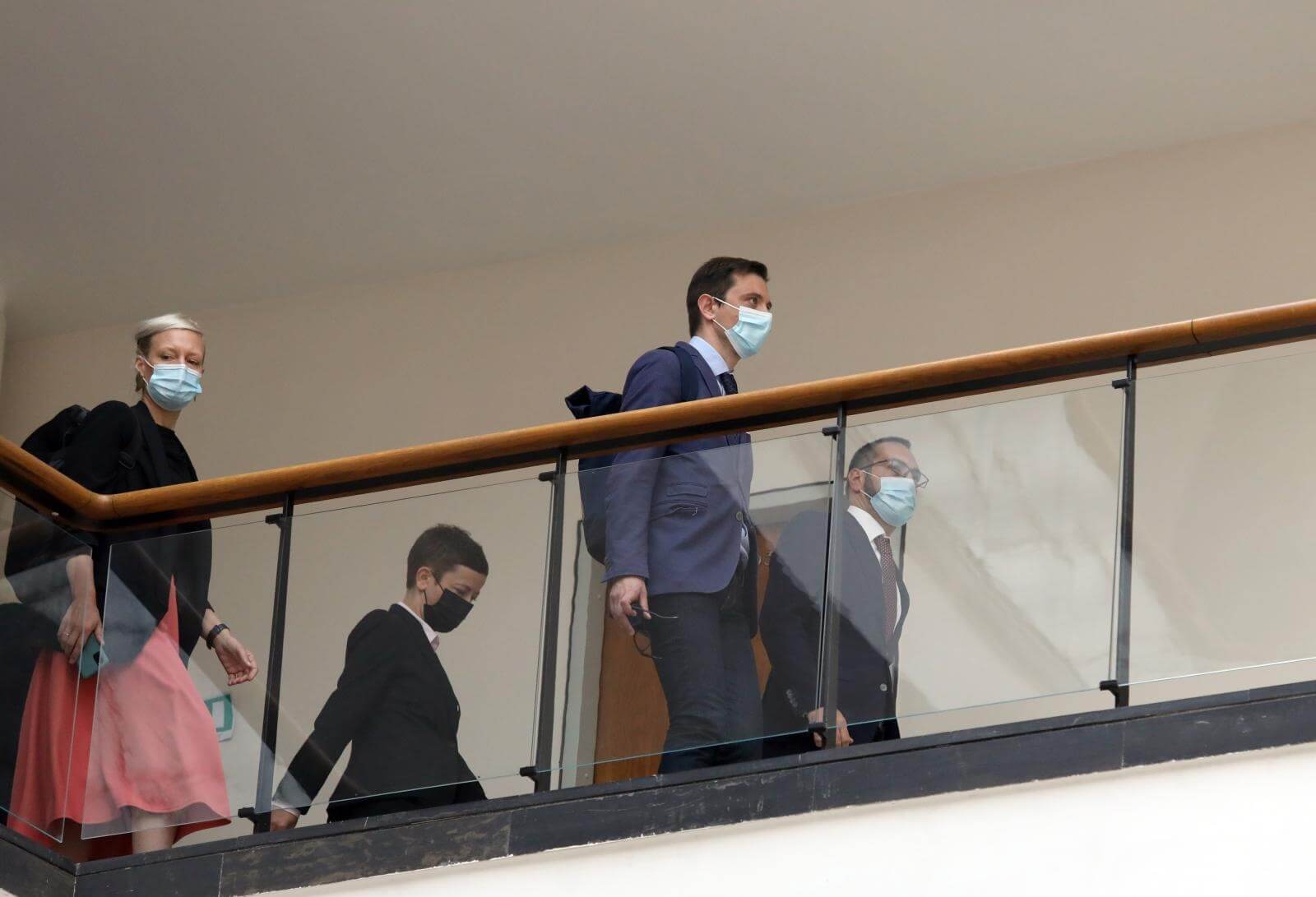
© Patrik Macek / PIXSELL
Highlights of the week: Tomislav Tomašević officially. becomes the new mayor of Zagreb
Zagreb local elections winner Tomislav Tomašević met with Jelena Pavičić Vukičević for an official ceremony of transferring power on Friday, which makes Tomašević officially the new mayor of Zagreb.
Media attention was also caught for the fact that Tomašević was four minutes late to the ceremony because he was waiting for the ambulance on Cibona because a woman fell ill in the middle of the street. But, for the bigger public interest, it's important to note today was the first time for Tomašević to have a detailed view on the financial situation of the City of Zagreb, giving him a clear picture of the debt problem Zagreb has.
As TCN reported earlier, Tomašević told the press after the ceremony that the situation is not good, but there are solutions. Still, so far, no more details were given on the two-thousand-odd-page reports on the 2020 budget execution and preliminary figures. Additionally, the new city assembly would hold the founding meeting on 17 June.
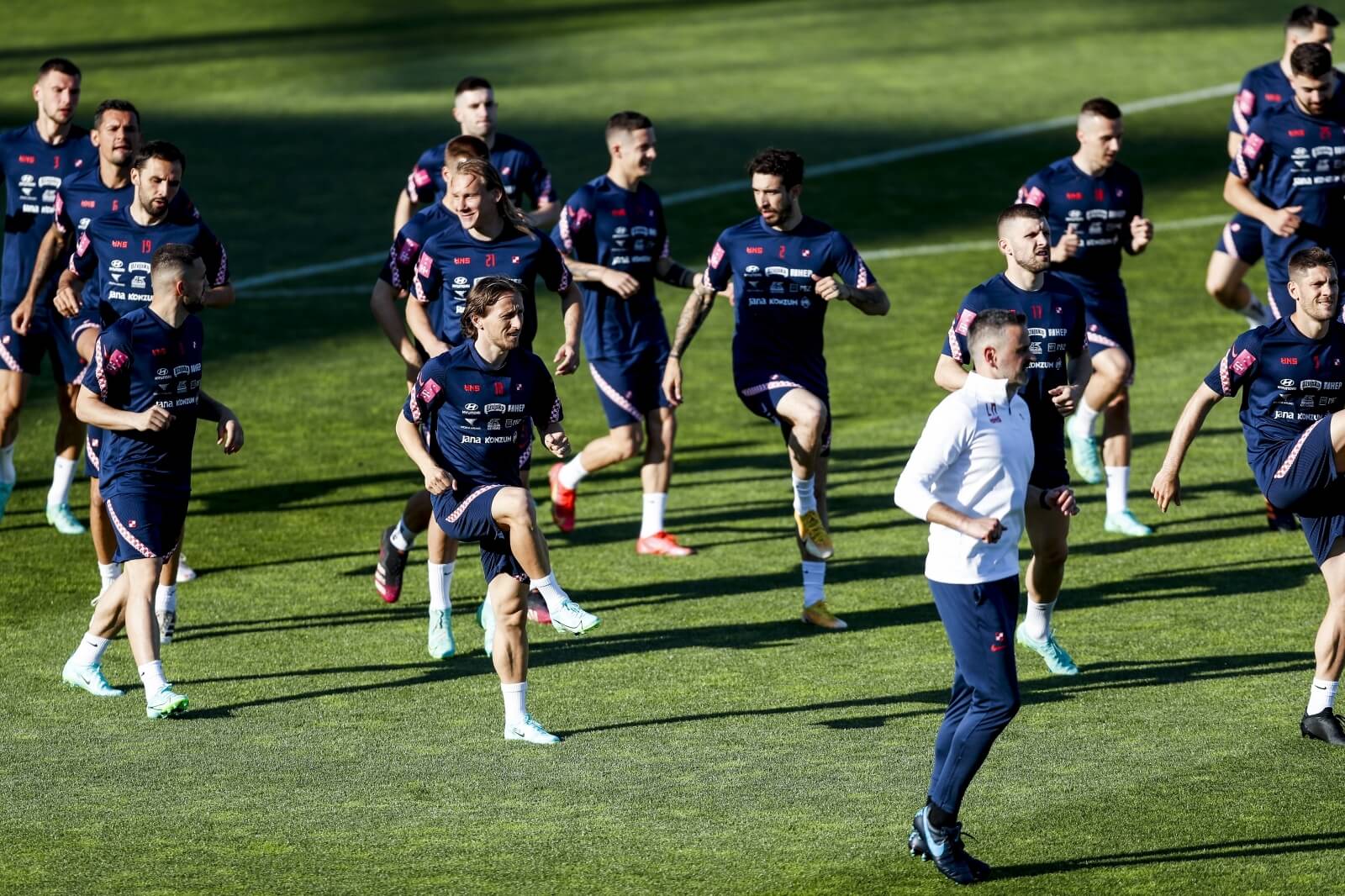
© Slavko Midzor / PIXSELL
Highlights of the week: Zlatko Dalić on Croatian National Football Team
The Croatian National Football Team is preparing for the friendly clash with Belgium. As reported by TCN, Zlatko Dalić faced the press on Friday ahead of the match.
„I am satisfied with everything except the result. We had minor injury problems. We did the rest as expected, but the draw with Armenia left a bitter taste. In that game, we had to win 4-0 or 5-0, not draw 1-1. I am dissatisfied with this result. Plus, we created 5-6 percent chances, and we didn't do that in three games in a row at the beginning of the World Cup qualifiers against Slovenia, Cyprus, and Malta. We were nonchalant and irresponsible and did not realize them. We were not specific, and that is a minus“, said Dalić to the press.
Dalić also pointed out that the national team is aware of its obligation to the Croatian people. He spoke about the problems in the national team, the pros and cons of the draw against Armenia, and the expectations from players who are dissatisfied with their status. One of them is Andrej Kramarić, who, after 20 goals scored in the Bundesliga this season, is not safe among Dalić's starters. A few days ago, he advised the media to ask Davor Šuker what he would say after such a season.
Expectionsare big ahead of the EURO championship, and no doubt fans will pay attention with close interest.
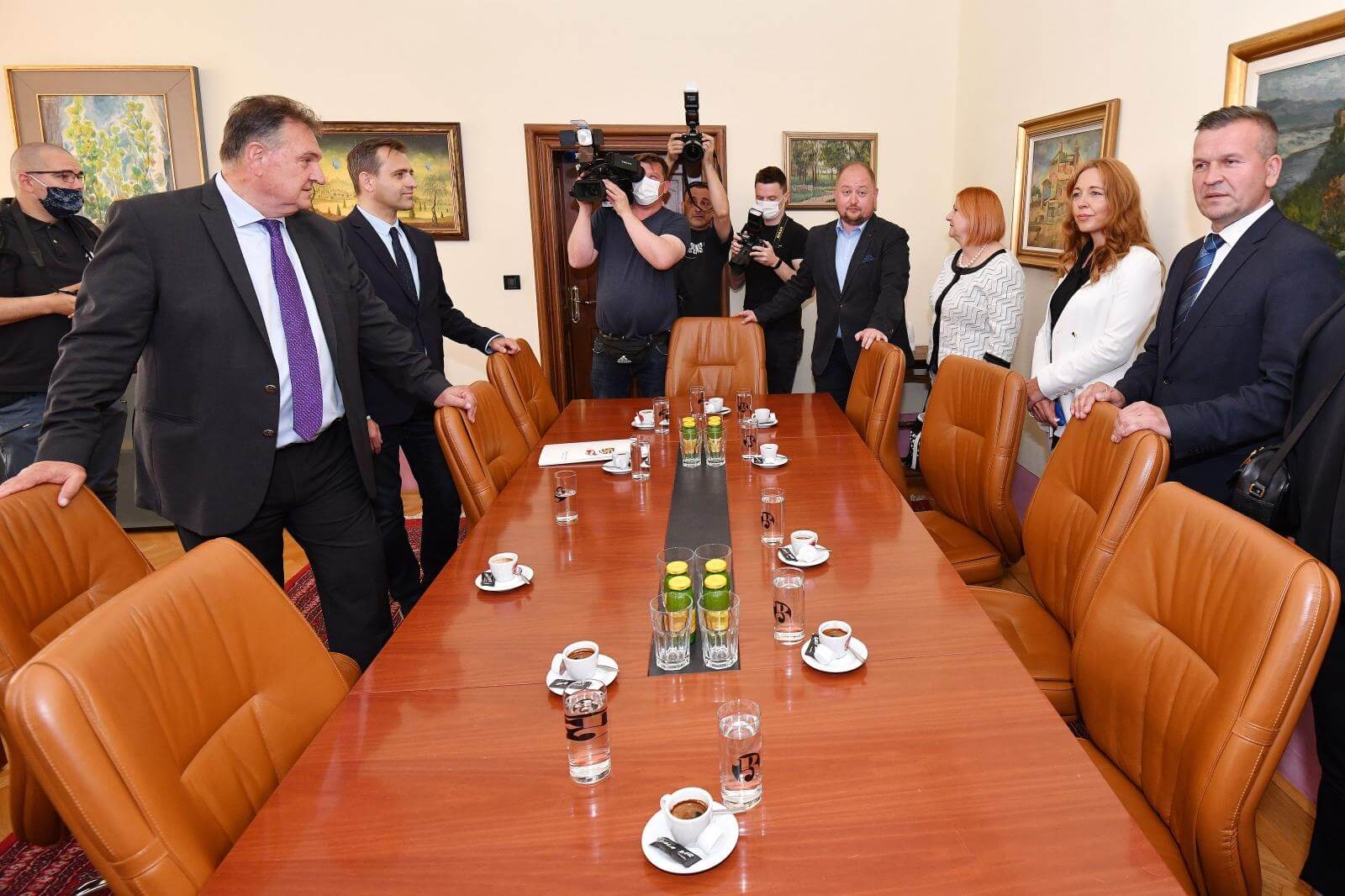
© Vjeran Zganec Rogulja / PIXSELL
Highlights of the week: Anđelko Stričak, new prefect
The power transfer ceremony on Friday also took place in Varaždin where Anđelko Stričak defeated current Varaždin prefect Radimir Čačić.
„The victory is well deserved. In the past nine years as the president of Varaždin county organization of the Croatian Democratic Union (HDZ), and in six years as a member of the parliament, I've been to every corner of Varaždin county and talked to everybody. I heard the needs of our citizens, and I tried to solve them by cooperating with coalition partners on every level. Of course, I'm not the best, most capable or most perfect, but I will try with my team to give my best that everybody in the county feel changes for the better“, said the new Varaždin County prefect Stričak, as reported by Varaždin county's official website.
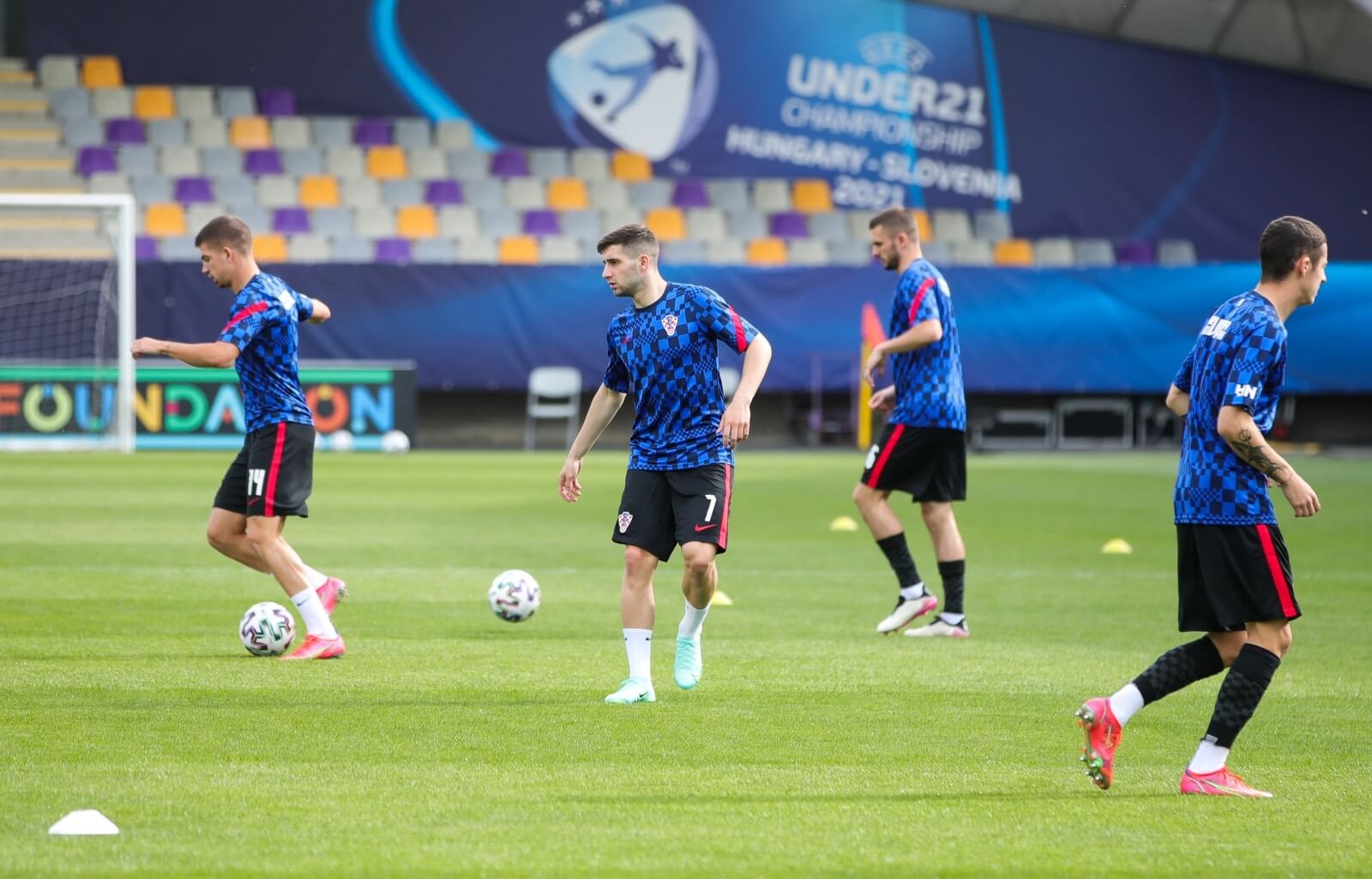
© Sanjin Strukic / PIXSELL
Highlights of the week: Croatia Loses to Spain in the Under-21 European Championship
Spain was better than Croatia after extra time in the Under-21 European Championship quarter-final in Maribor on Monday. The match ended 2:1. As reported by TCN, Croatia was solid in the first half and threatened the Spain goal on a few occasions. Despite Spain's high pressure, Ivanušec had a chance from 20 meters in the 7th minute, and in the 23rd, Bradarić's shot was blocked by the Spain defense. Spain retaliated with a Diaz shot from 20 meters, but Croatia's defense made it difficult for them to do much more.
The young Croatia national team fought against Spain for a spot in the semifinals.
Igor Bišćan's side met Spain at Ljudski Vrt stadium in Maribor.
"The guys are aware that we have a great chance, they are motivated to do something, and we are all around them to give them that chance and be supportive. They have quality," Bišćan announced before the match. 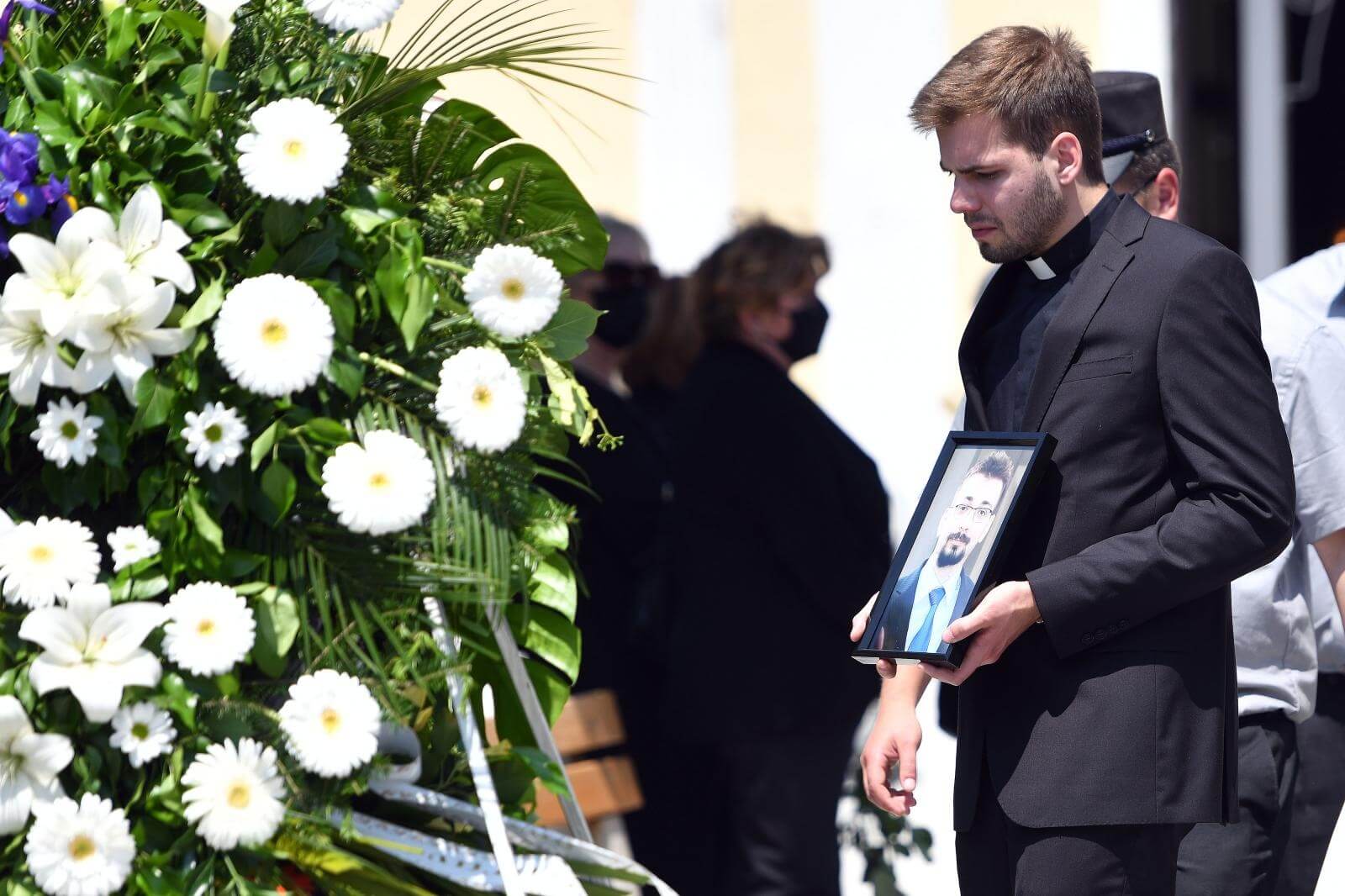
© Vjeran Zganec Rogulja/ PIXSELL
Highlights of the week: Nino Čengić funeral in Varaždin
The Funeral of the English professor Nino Čengić who passed away last Sunday, was held on Wednesday. Nino Gengić, a substitute English professor in one Varaždin school, was brutally beaten with bats and chains in front of the local club in Varaždin called Kulturana. He was 35 years old.
As Jutarnji List reports, four suspects aged 24-29 are currently in custody while the investigation is ongoing as to what lead to this attack. Suspect's apartments were searched, and one suspect illegally possessed a considerable amount of ammo and fire weapons to match. All suspects were previously known to the police for troubling behavior, and the most tragic was the fact that 15 people witnessed the beating, but nobody stopped it.
To learn more about Croatia, have a look at our TC website.
For more about news in Croatia, follow TCN's dedicated page.


